|
Supplement
No.
26November 10, 2019
Havana Anti-Imperialist Solidarity Conference,
for Democracy and Against Neo-Liberalism
Cuba Is
Not Alone
- Miranda
Jolie -
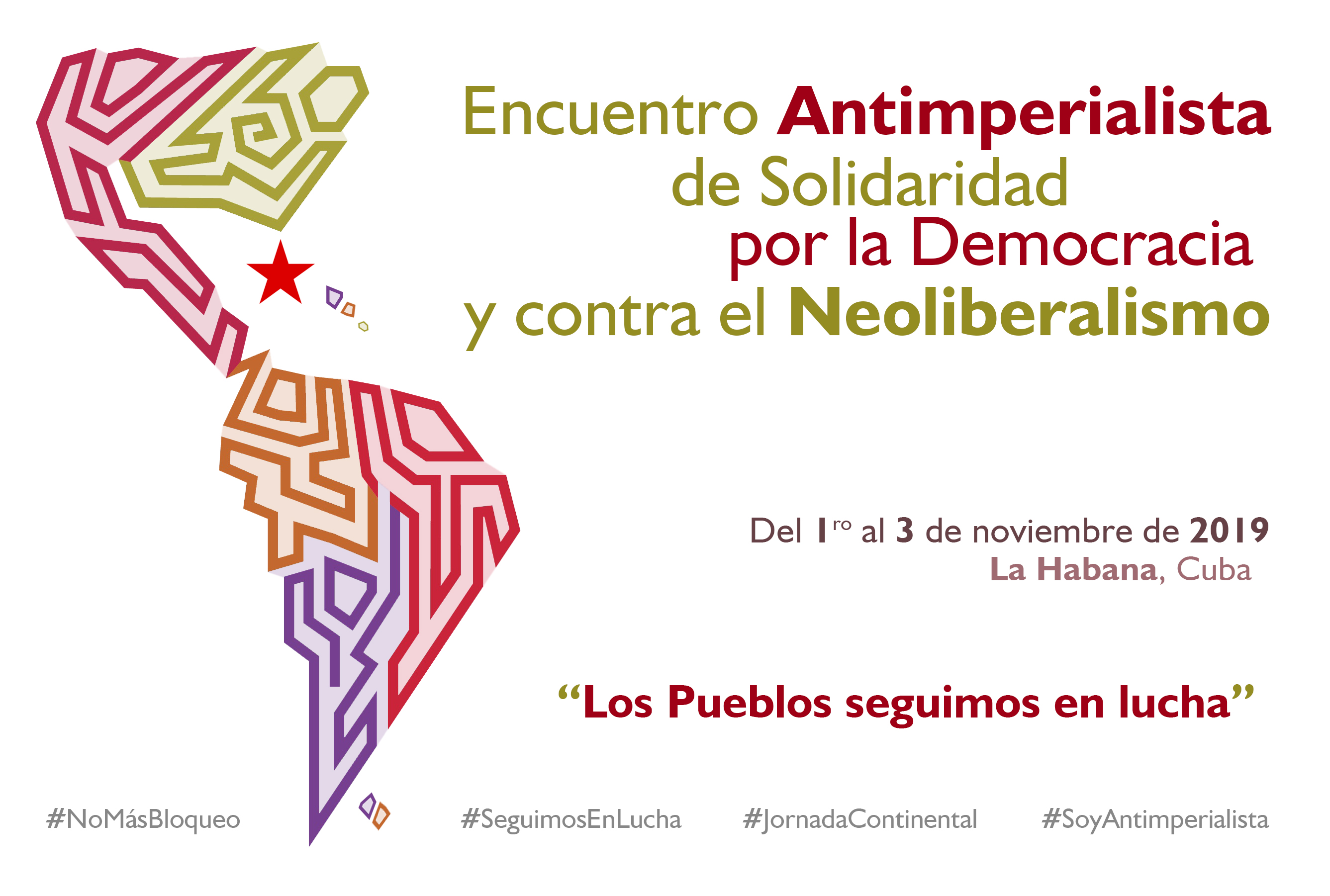
• Final Declaration
The Cuban Revolution at 60 --
International
Conference, Halifax, Nova Scotia
•
Halifax Hosts Largest
Gathering of Off-Island Specialists on Cuba
• Lead Negotiators Look
Back on Attempt to
Normalize U.S.-Cuba Relations
• The Havana Syndrome:
An Answer from Science
• Panel Discussions
Havana Anti-Imperialist
Solidarity Conference,
for Democracy and Against Neo-Liberalism
Cuba Is Not Alone
- Miranda Jolie -
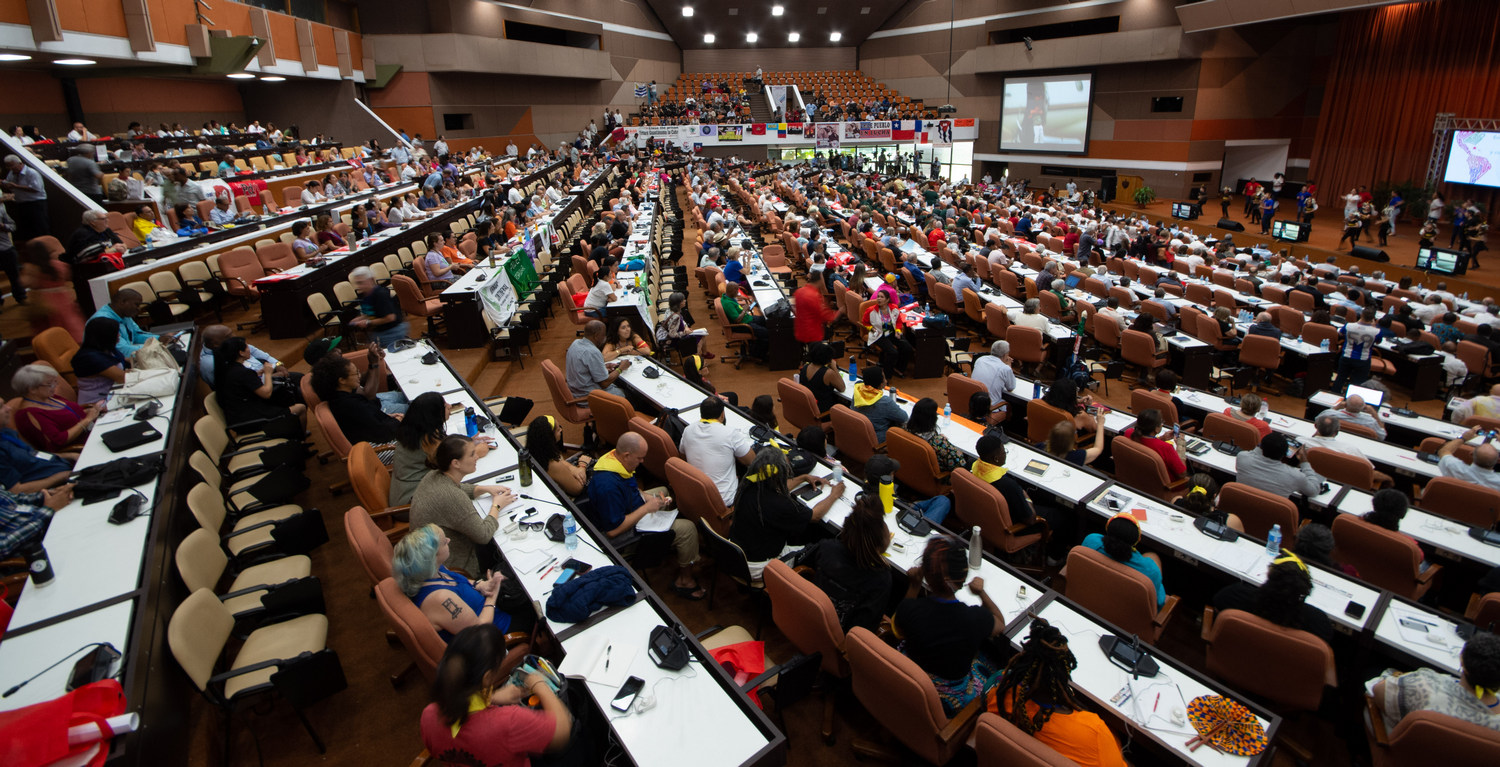
The Anti-Imperialist Solidarity Conference, for
Democracy and against Neo-Liberalism took place in Havana, Cuba from
November 1 to 3 with the participation of 1,400 delegates from 95
countries, according to Fernando González, President of the
Cuban Institute of Friendship with the Peoples (ICAP).
For three days, activists from different social
movements, political parties and social organizations from all over the
world met in Cuba to express their solidarity with the Cuban people and
their repudiation of the blockade imposed on Cuba by the United States
in 1961 as well as the escalation of hostilities from the Donald Trump
administration towards the island.
The meeting was convoked and organized by ICAP and
the Central Organization of Cuban Trade Unions (CTC), along with the
Cuban Chapter of Social Movements and the Continental Conference for
Democracy and against Neo-Liberalism under the slogan "Hands Off Cuba."
According to a communiqué released by
ICAP, the purpose of the gathering was "to be a real contribution to
confronting the current counterrevolutionary offensive of U.S.
imperialism, to the search for the widest possible unity of progressive
forces in the region and to strengthening militant solidarity with the
just causes defended by the peoples. In the current political
situation, marked by the aggressiveness of the Trump administration,
new ways will be sought to reinforce solidarity with these causes in
the world, mainly in our region."
Opening Speeches: Fernando González
and Bruno Rodríguez Parrilla
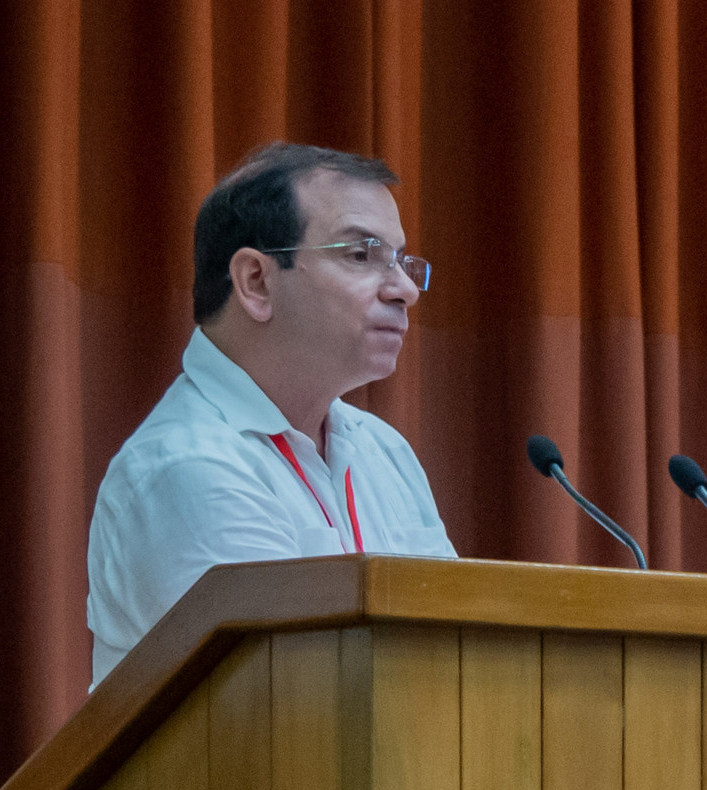 In his
opening speech, Fernando González, Hero of the Republic of
Cuba, dedicated the event to the memory of Fidel Castro, the historic
leader of the Cuban Revolution "whose concepts, ideas and personal
example constitute our guide in the sure path to victory." In his
opening speech, Fernando González, Hero of the Republic of
Cuba, dedicated the event to the memory of Fidel Castro, the historic
leader of the Cuban Revolution "whose concepts, ideas and personal
example constitute our guide in the sure path to victory."
He highlighted that Cuba has gone through 150
years of struggle and has 60 years of Revolution and "here we are,
standing, building the socialist project we dared to dream, with the
protagonism of the people."
"The United States threatens and slanders Cuba so
that they don't have to recognize their failure in overthrowing our
Revolution and they misrepresent the altruistic medical cooperation
Cuba offers in more than 80 nations. There is no better tribune than
this space, to confirm that Cuba will not renounce nor ever betray its
principles nor solidarity with the other peoples of the world,"
stressed González.
For his part, the Cuban Minister of Foreign
Affairs, Bruno Rodríguez Parilla, who also participated in
the inauguration of the conference, stated that Donald Trump's
government is the main threat to international peace because of its
increasing interference in domestic affairs of the peoples of the
world. He also underlined that "there will not be sustainable
development without the Southern countries' right to
development or without social justice."
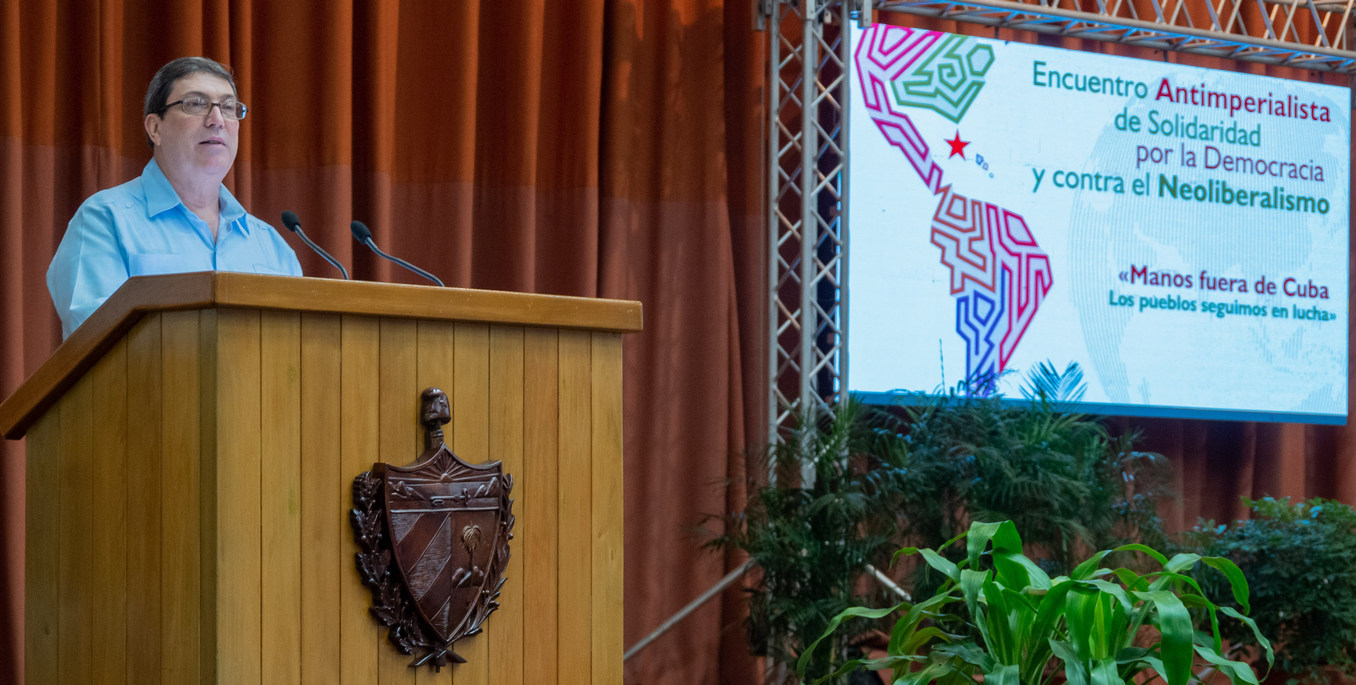
Rodríguez Parrilla thanked the
activists for the solidarity Cuba has received and stressed that "hard
times" are coming.
He referred to the latest measures taken by the
U.S. against Cuba, such as limiting travel to the islands, the
increasing human rights violations and smear campaigns.
"The U.S. needs to blame Cuba for their complete
failure in Venezuela and they need to justify toughening the blockade.
We do not have any participation or involvement whatsoever in the
protests taking place in Latin America other than the example of the
Cuban Revolution," the Foreign Minister said.
He also denounced the unjust imprisonment of
former Brazilian president Luis Inacio "Lula" da Silva, the actions of
the Organization of American States (OAS) and the activation of the
Inter-American Treaty of Reciprocal Assistance (Rio Treaty) ) against
Venezuela under "absurd pretexts."
Also present in the opening session were:
José Ramón Machado Ventura, Second Secretary of
the Communist Party of Cuba; and Esteban Lazo Hernández,
President of the National Assembly of People's Power and President of
the Council of State, as well as the former President of El Salvador,
Salvador Sánchez Cerén; the Prime Minister of St.
Vincent and the Grenadines, Ralph Gonsalves; and other outstanding
personalities. A cultural performance by the children of the Colmenita
theatre company was also enthusiastically received by the participants
in the event.
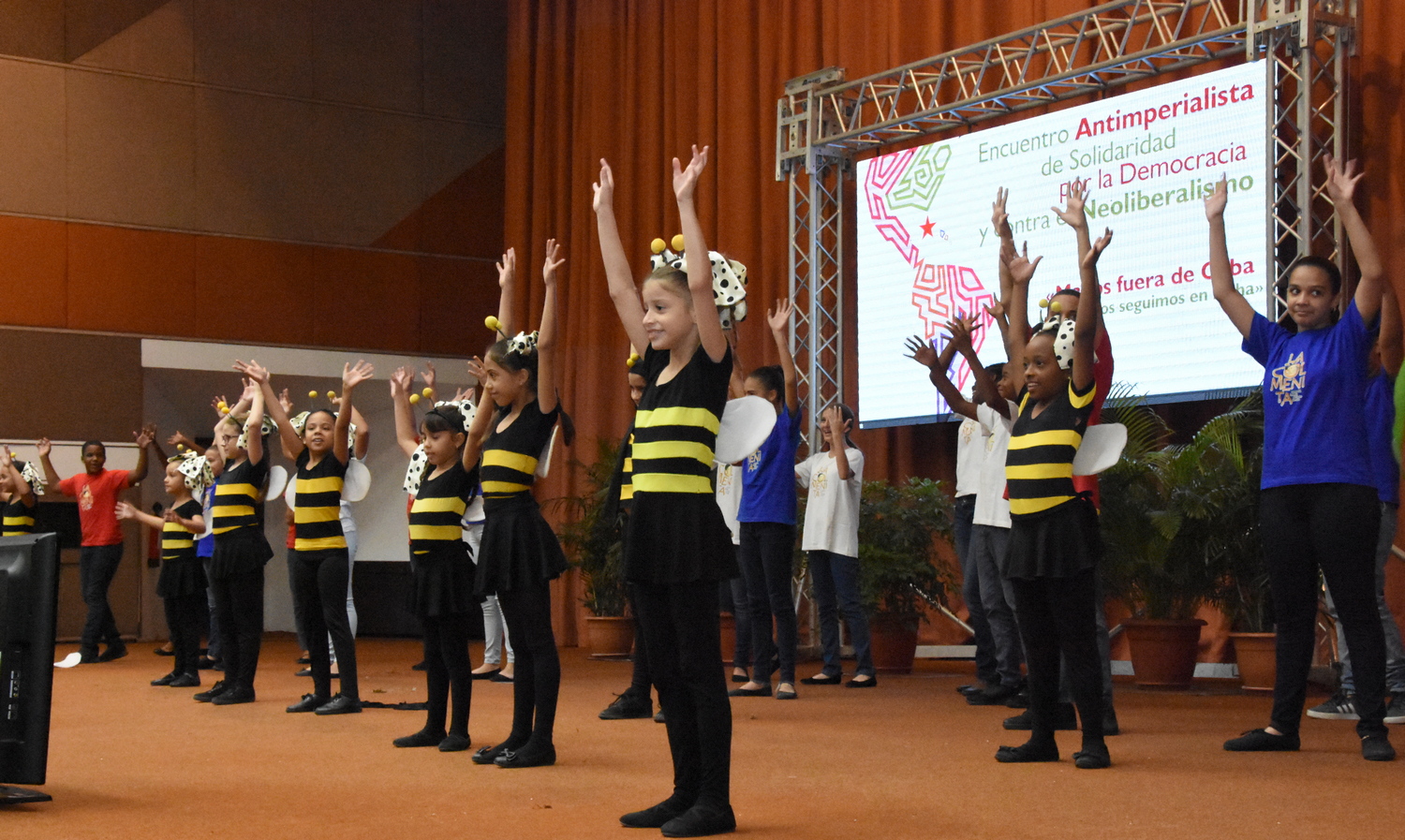
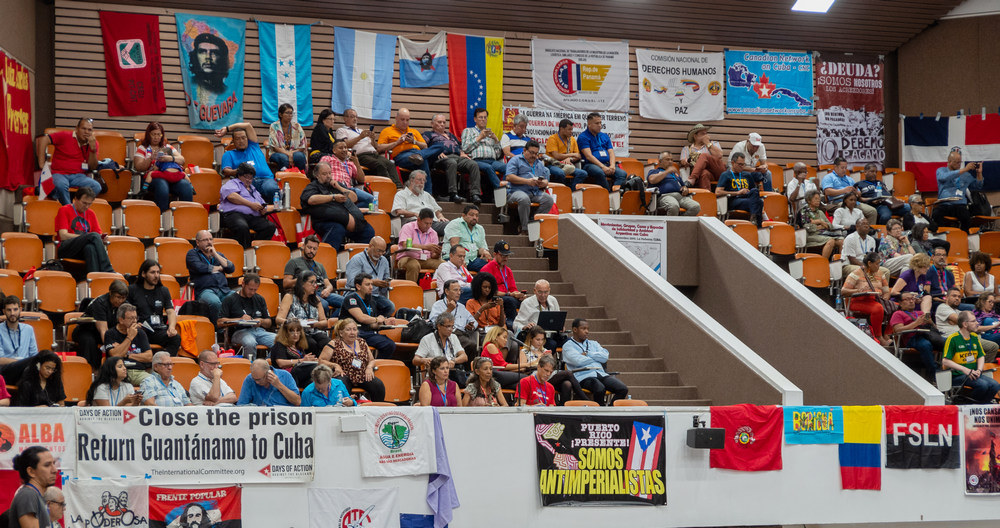 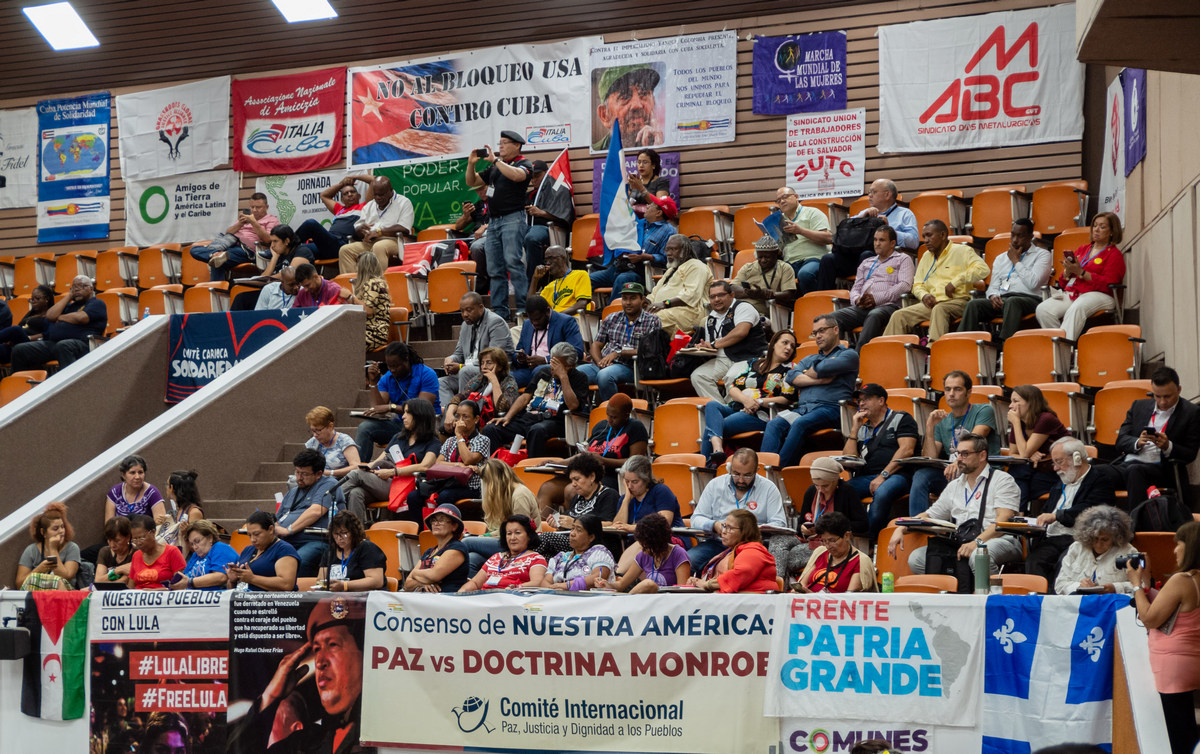
Day One started with a panel in which prominent
intellectuals and activists shared their views on the current
developments in Latin American and world politics and the role in it of
social and workers' movements as well as the challenges facing the
left. Interventions followed from the floor in which people from all
regions of Latin America, the Caribbean, the United States, Quebec and
the world spoke.
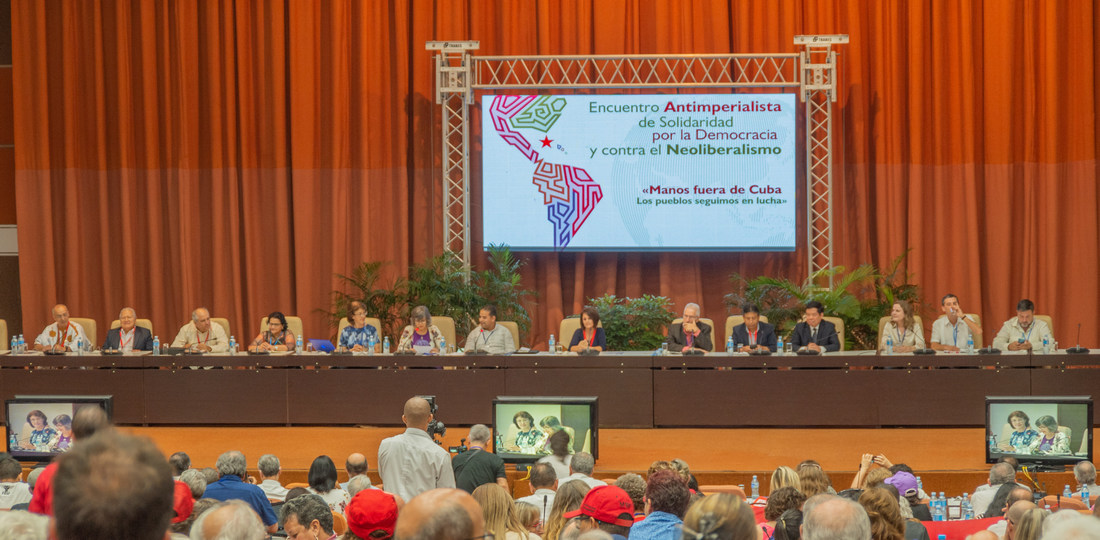
At mid-day there was a wave of discussion and
solidarity organized outside the Convention Hall where delegates from
around the world spoke to the media and one another.
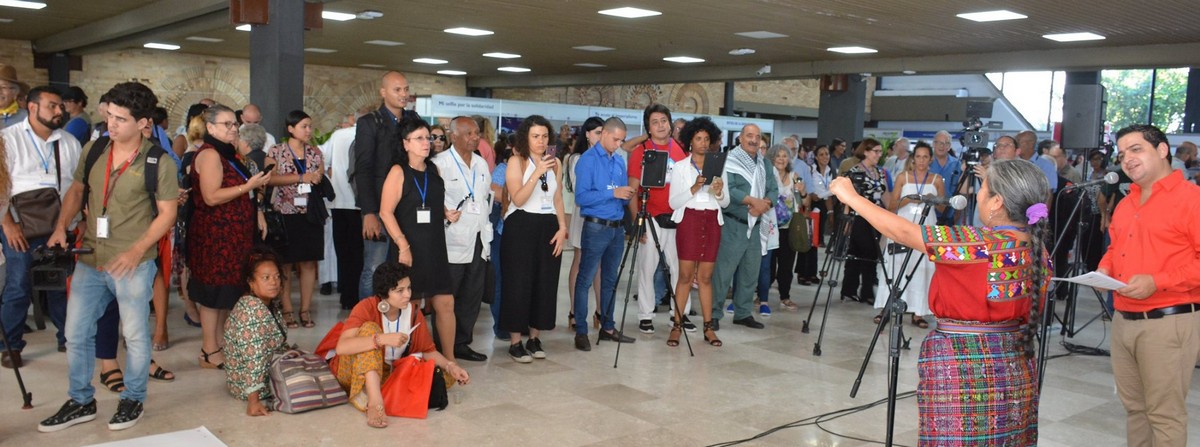
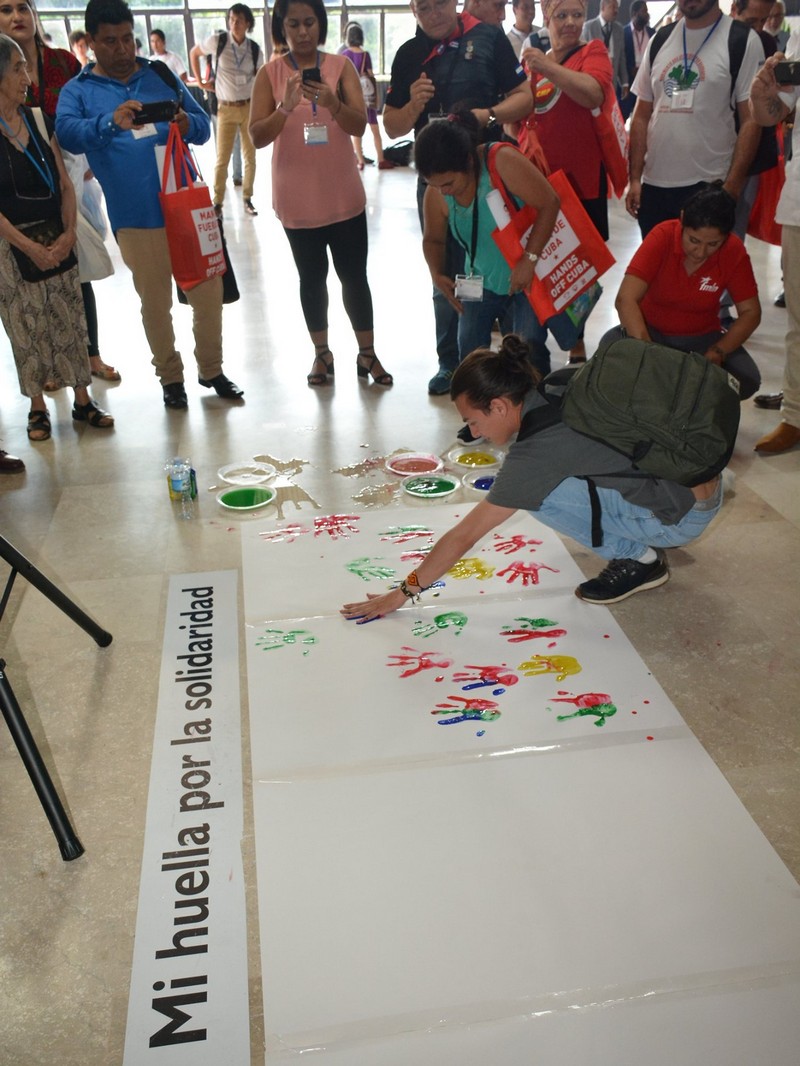 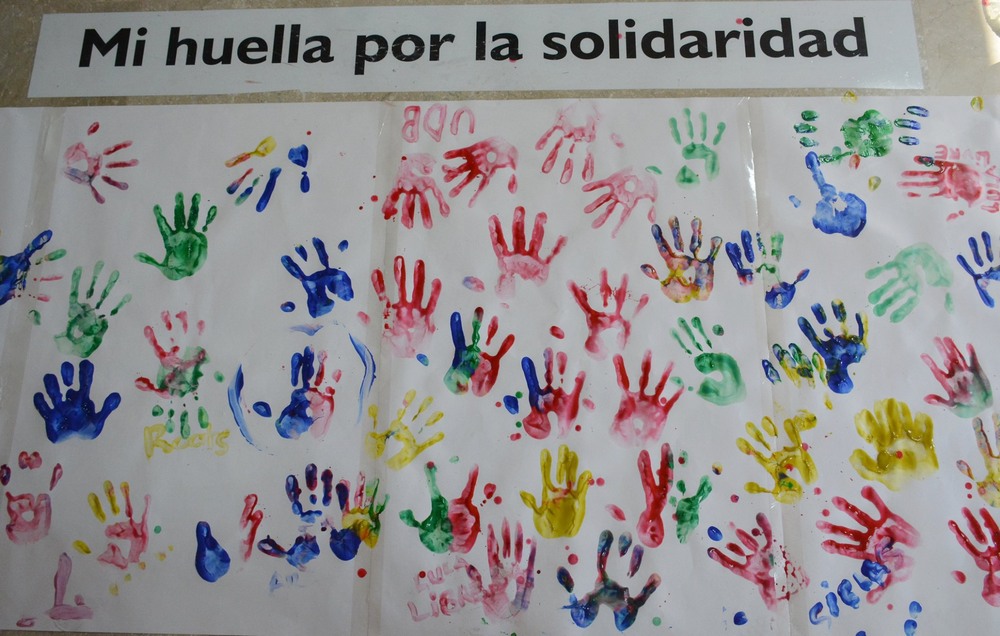
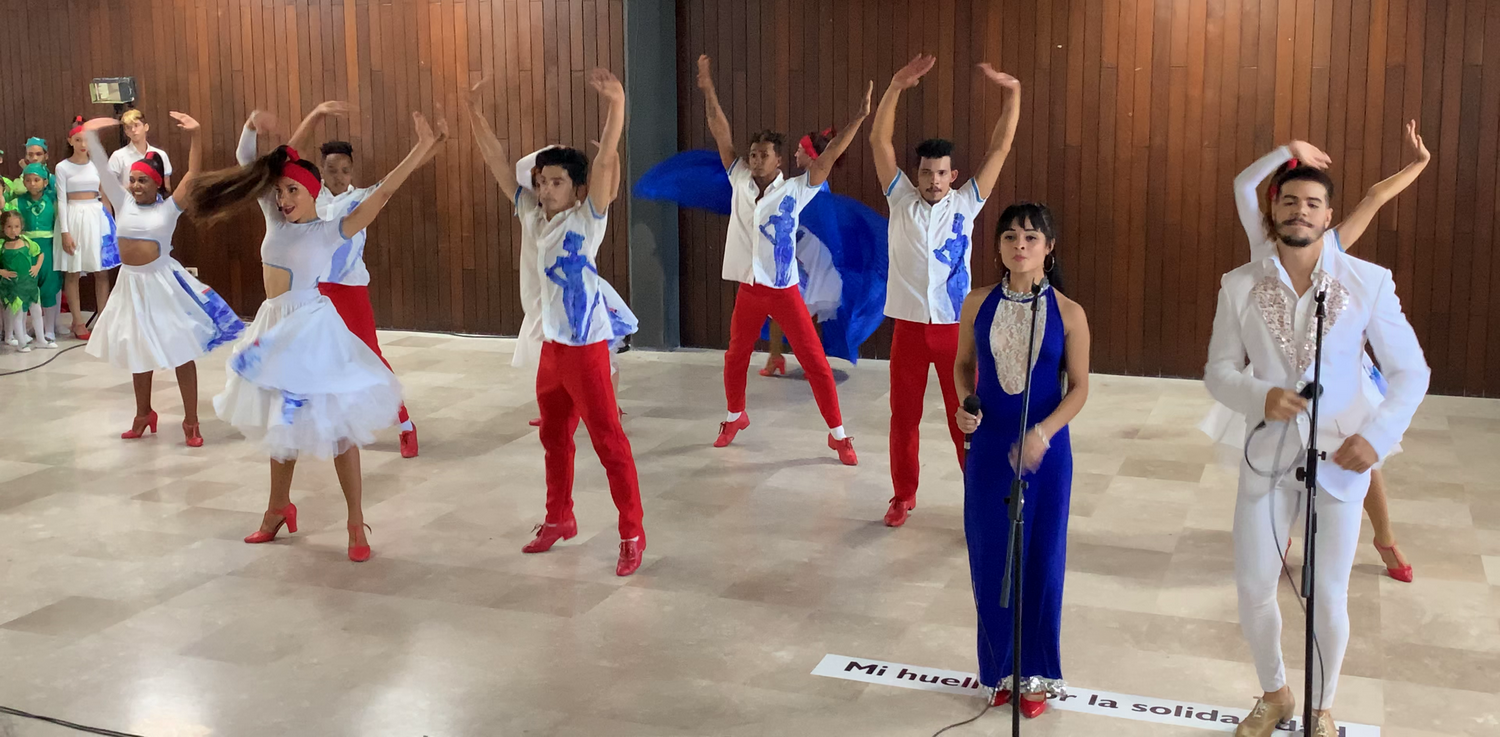
Bonding with the People
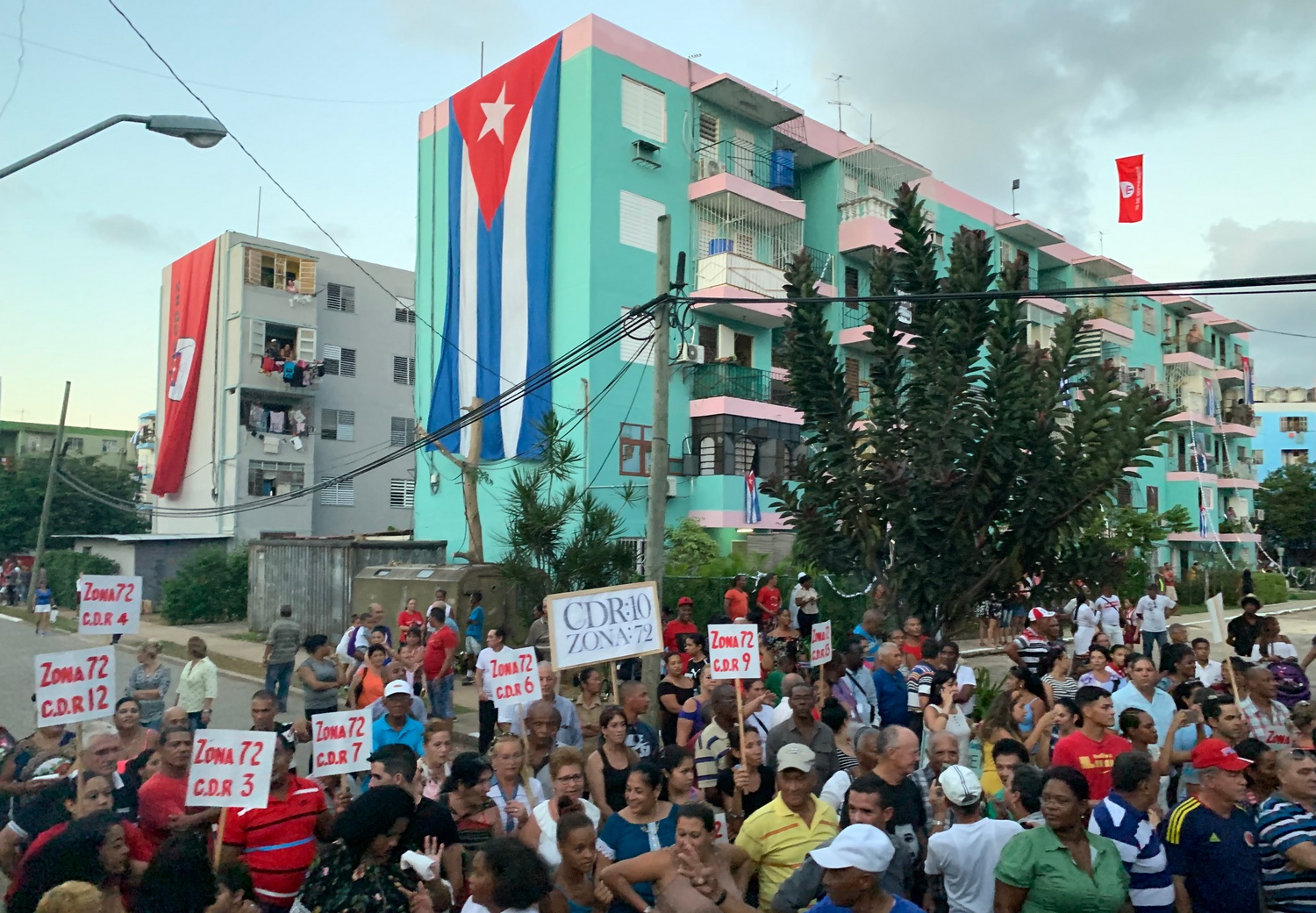
In the evening, delegates were invited by the
Committees in Defence of the Revolution (CDRs) from the district of
Barbosa, on the outskirts of Havana, to join them in an
Anti-imperialist Tribune. As the buses carrying the delegates arrived
in Barbosa, Cuban flags and slogans were hanging from buildings,
windows, balconies and along the streets, creating a festive
atmosphere. Hundreds of local residents were out in the streets waiting
to greet the delegations and to take contingents to the different CDRs.
There is one CDR per block and, at each, neighbours explained to the
visitors what CDRs do, how they work and are organized. They also
explained how the Cuban people organize in general for daily life and
for the defence of the Revolution. Children from the community recited
poems and gave presents and drawings to those visiting their CDR.
Neighbours also offered the food they traditionally cook when there is
a CDR celebration and exchanged experiences with the delegates who
expressed their gratitude for such a warm welcome.
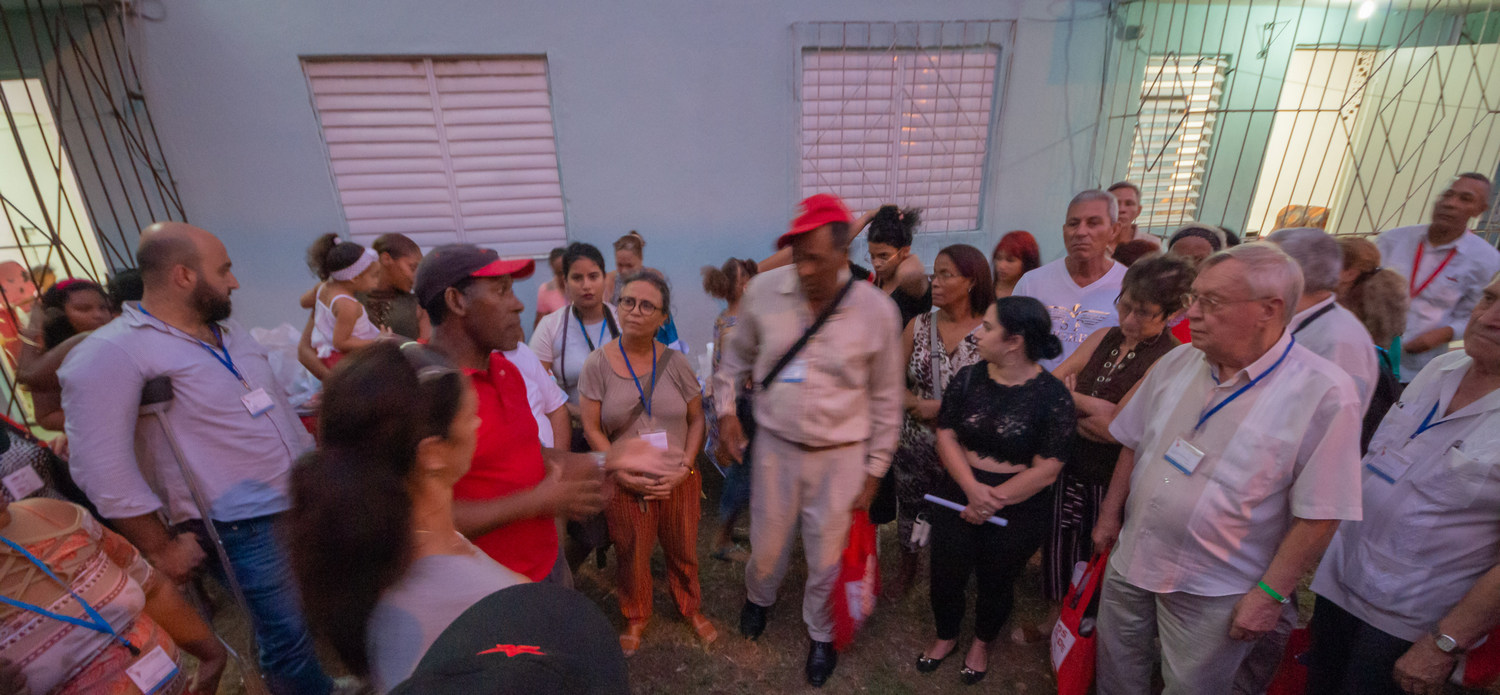
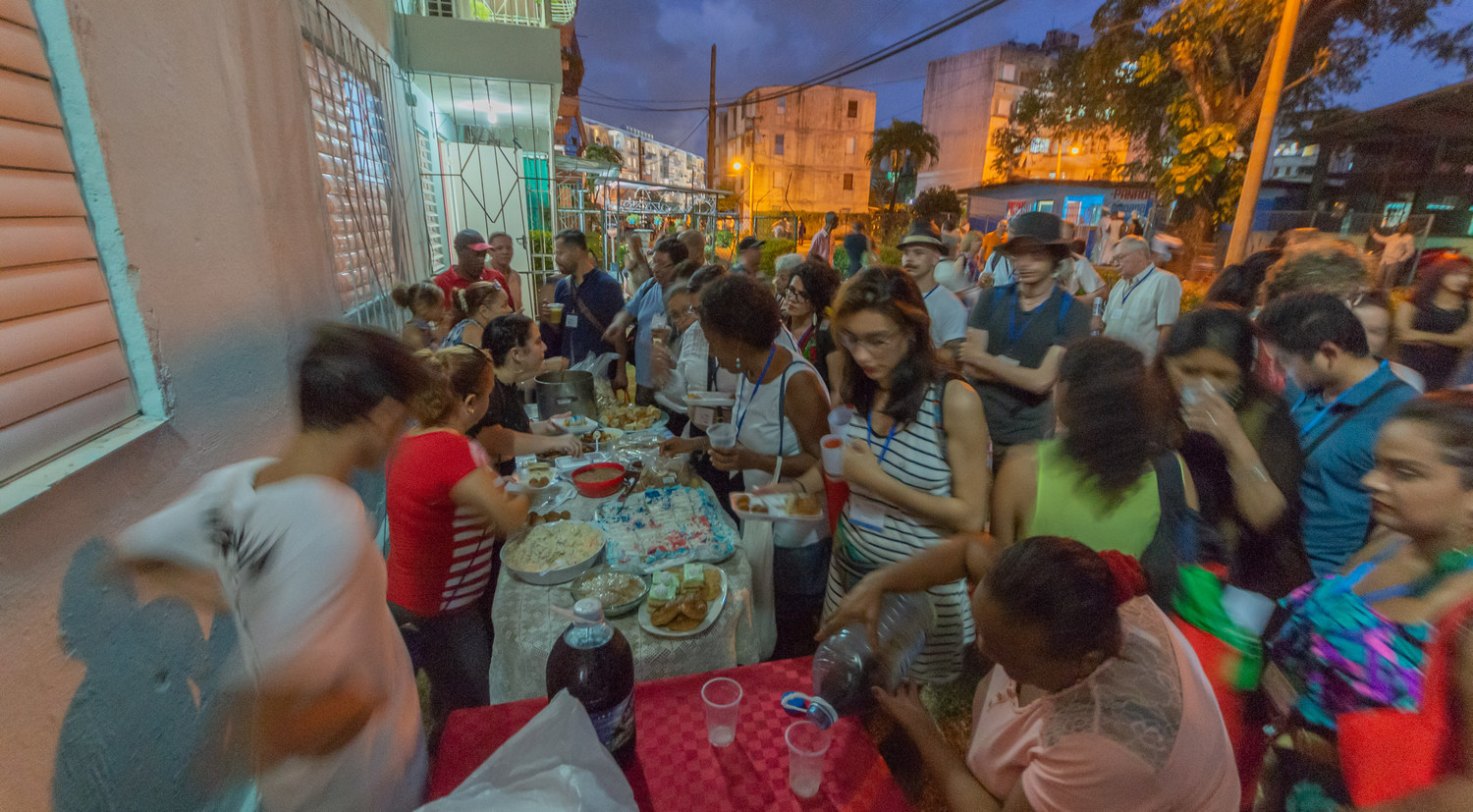
Fernando González, President of ICAP,
then addressed all those gathered in a central area. The musical group
Pupy y Los que Son, Son performed while videos were projected on a big
screen and people danced and discussed with one another late into the
evening.
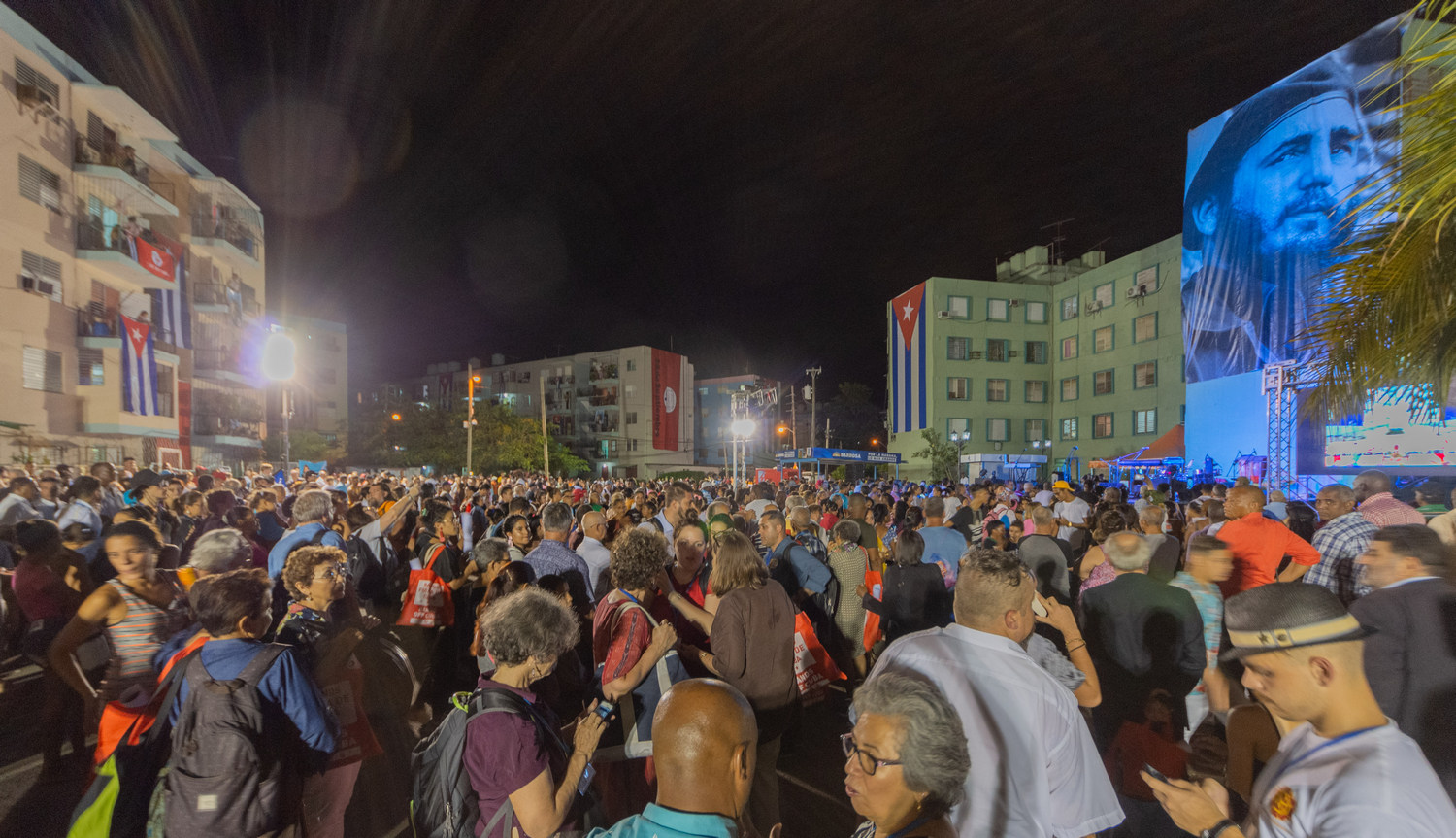
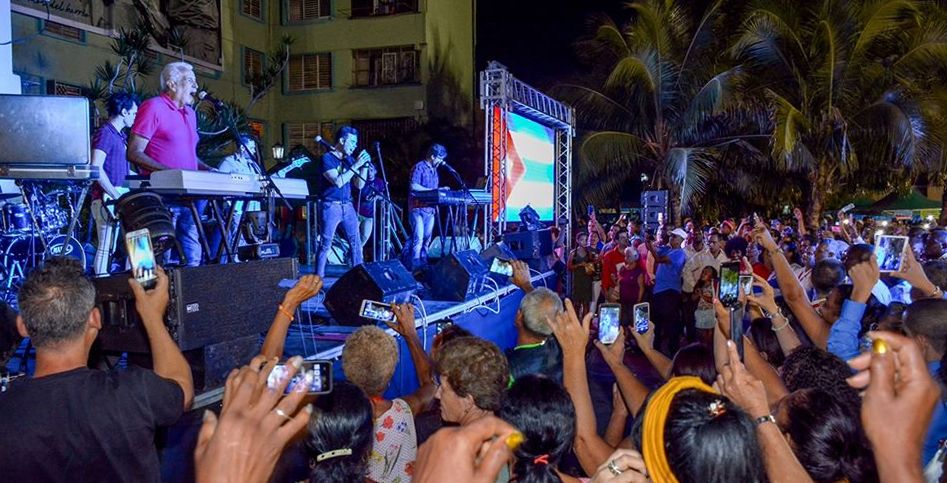
The tradition of holding Anti-Imperialist Tribunes
was started on the island at the end of 1999 and the beginning of the
year 2000, when the Cuban people fought for the return of
Elián Gonzalez -- the Cuban child whose mother had taken him
illegally to the U.S. and following an accident in which she died, he
was found at sea and taken to the U.S. His father started a legal
battle to bring him back to Cuba. This battle was initiated by Fidel
Castro, and backed by the entire Cuban people, the people of the United
States, Canada and the world. It was in the course of this fight that
Fidel Castro launched the "Battle of Ideas." The Anti-Imperialist
Tribunes became its venue. They were carried out every Saturday in
different neighbourhoods, to demand the return of Elián
which finally happened in June 2000, and was considered a big victory
of the Cuban Revolution. With time, the Anti-Imperialist Tribune was
built in Vedado across from the U.S. Interests Section building with
many historic demonstrations converging there. That Tribune is
currently undergoing renovation and the tradition continues.
The celebration of unity and friendship with the
Cuban Revolution in Barbosa certainly showed the enthusiasm of the
residents and guests from abroad for the Revolution and confirmed that
Cuba Is Not Alone.
Day Two of the Anti-Imperialist Gathering
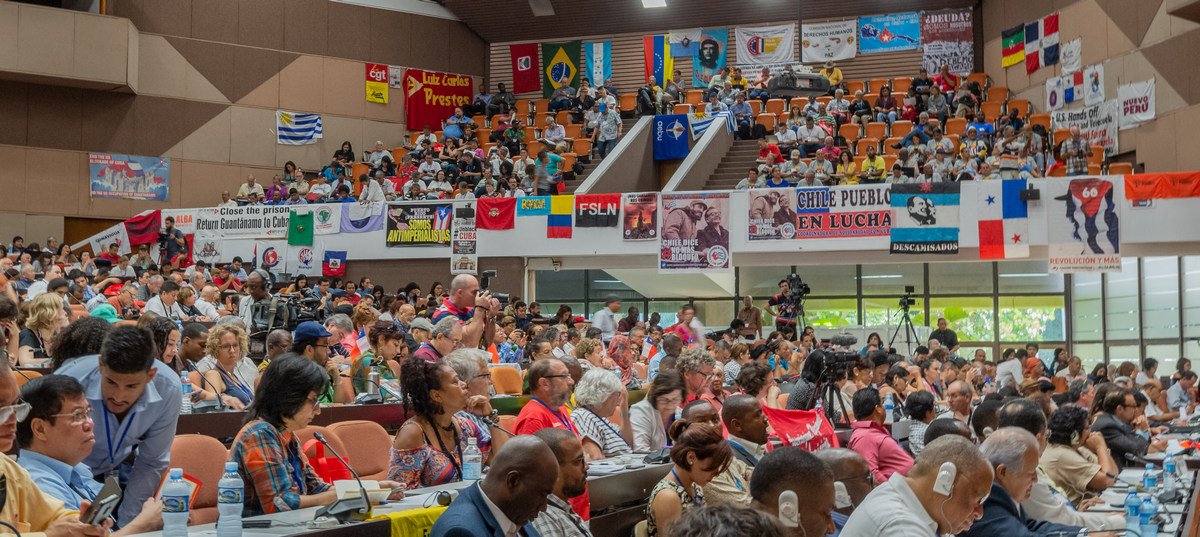
During the second day of debate, a main
panel in the morning included participation by Ismael Drullet,
from the Cuban Chapter of Social Movements, who stressed the importance
of unity and solidarity to face imperialism and capitalism; Ralph
Gonsalves, Prime Minister of Saint Vincent and the Grenadines, who
expressed the support of all those present for the Venezuelan people
and the role of the Caribbean countries in anti-imperialist solidarity;
Manuel Bertoldi, from Argentina, who highlighted the importance of the
uprisings taking place across Latin America; Félix
César Navarro Miranda, Bolivia's Minister of Mining and
Metallurgy; and a representative of the People's Republic of China, who
highlighted the importance of the relations between China and Cuba and
said that his country will "continue to support, as always, the just
cause of this Caribbean Island, its sovereignty and socialism according
to its national conditions."
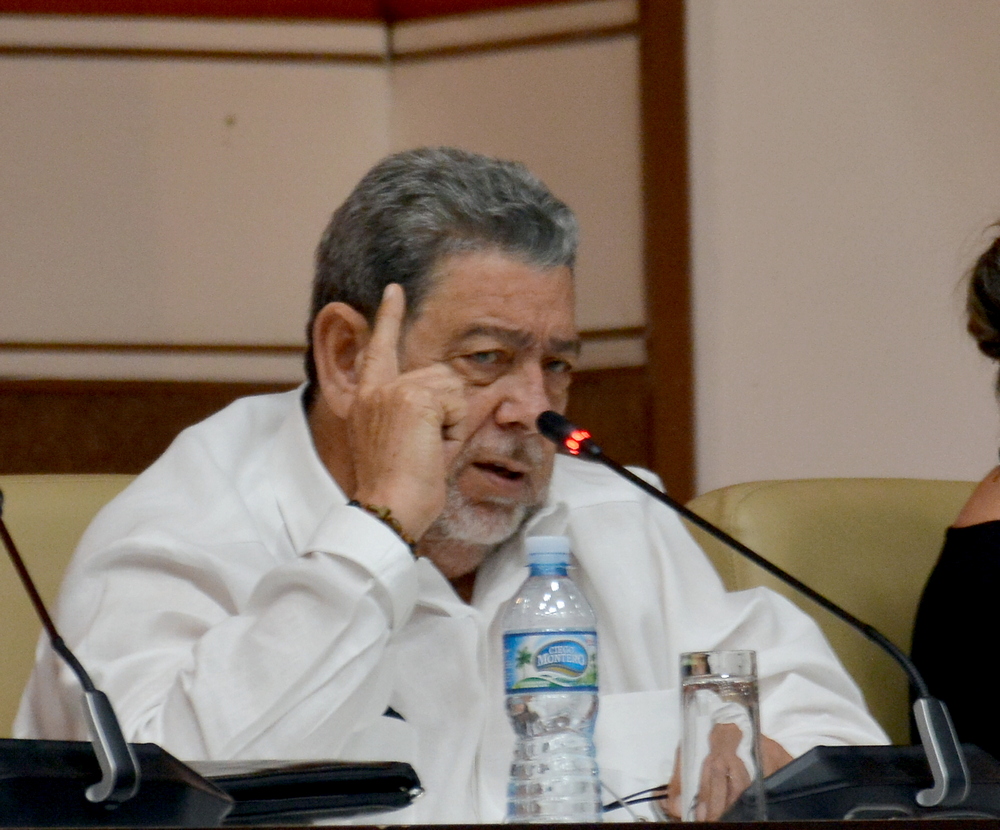 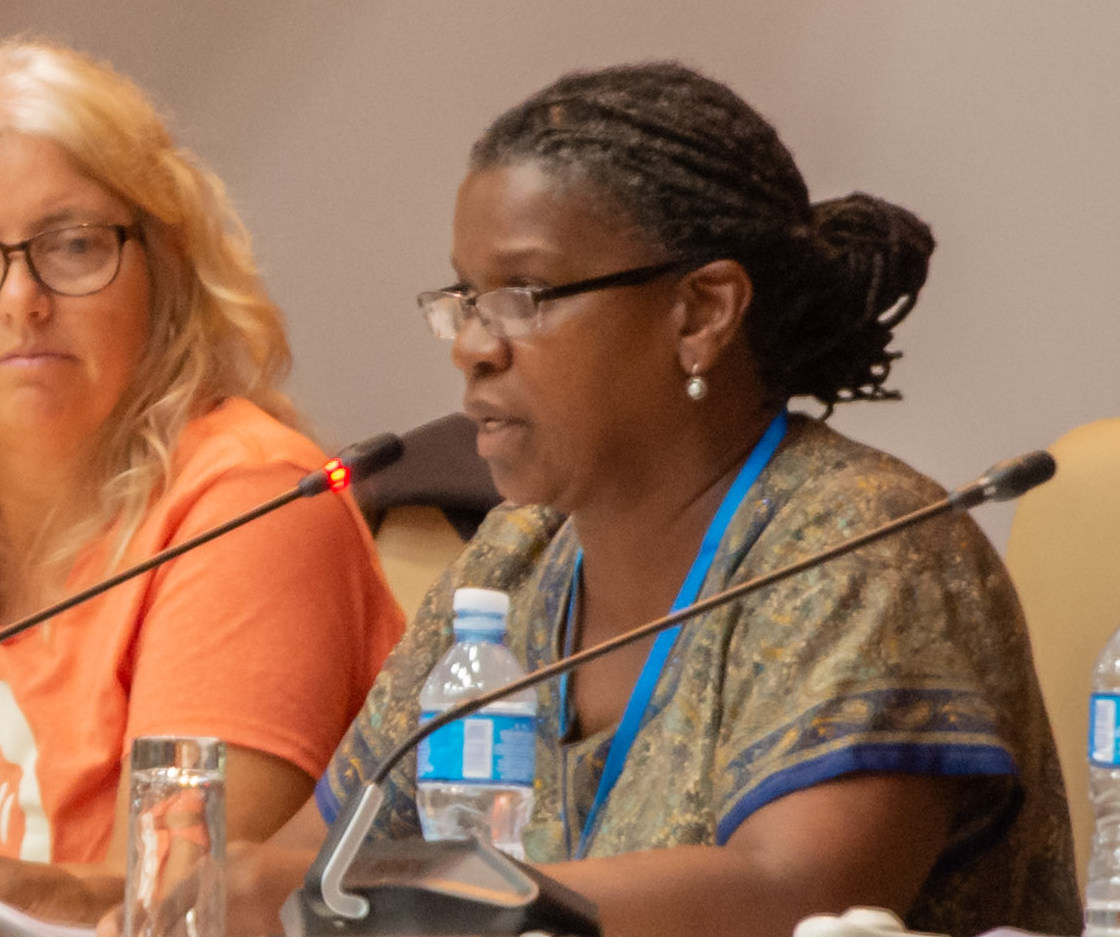
Notable speakers on Day 2 included Ralph Gonsalves, Prime Minister of
Saint Vincent and the Grenadines (left) and Gail Walker, Executive
Director of IFCO-Pastors for Peace.
In the afternoon the work was divided among
different commissions:
Commission 1:
Solidarity with Cuba and other just causes;
Commission 2:
Peoples in the face of free trade and the transnationals;
Commission 3:
Decolonization and cultural war. Strategic communications and social
struggle;
Commission 4:
Youth: strategies and continuity in struggles;
Commission 5:
Democracy, sovereignty and anti-imperialism; and
Commission 6:
Integration, identities and common struggles.
The reports of the Commissions were later
presented to the plenary session.
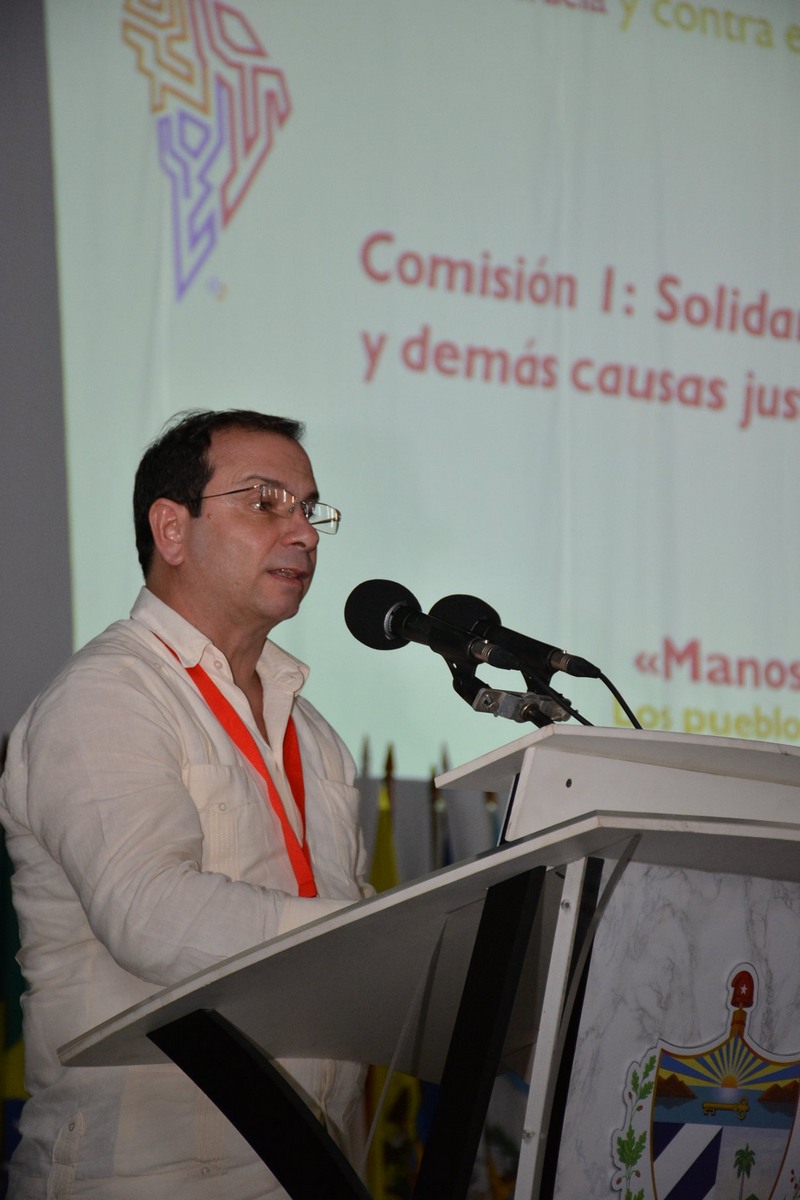 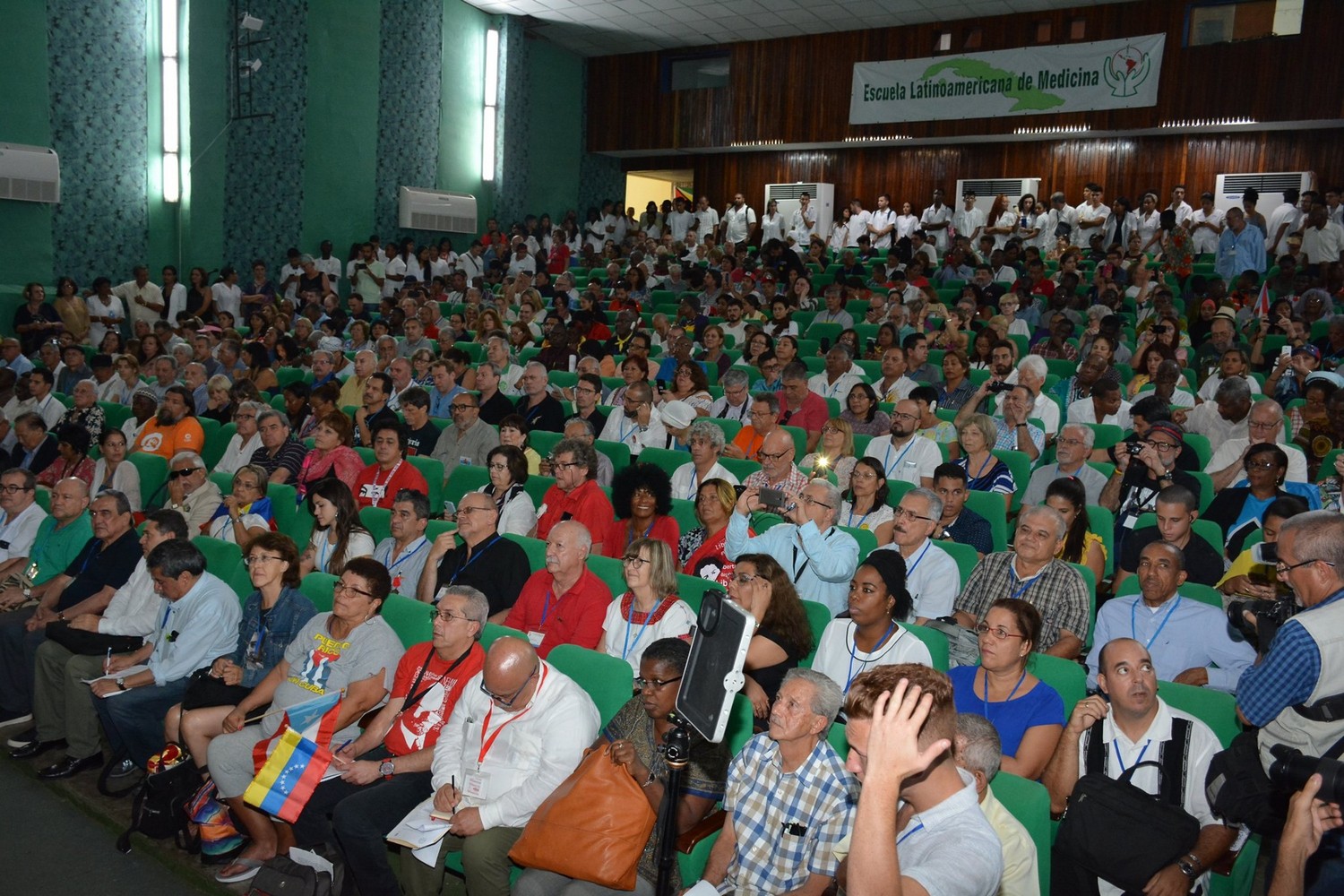
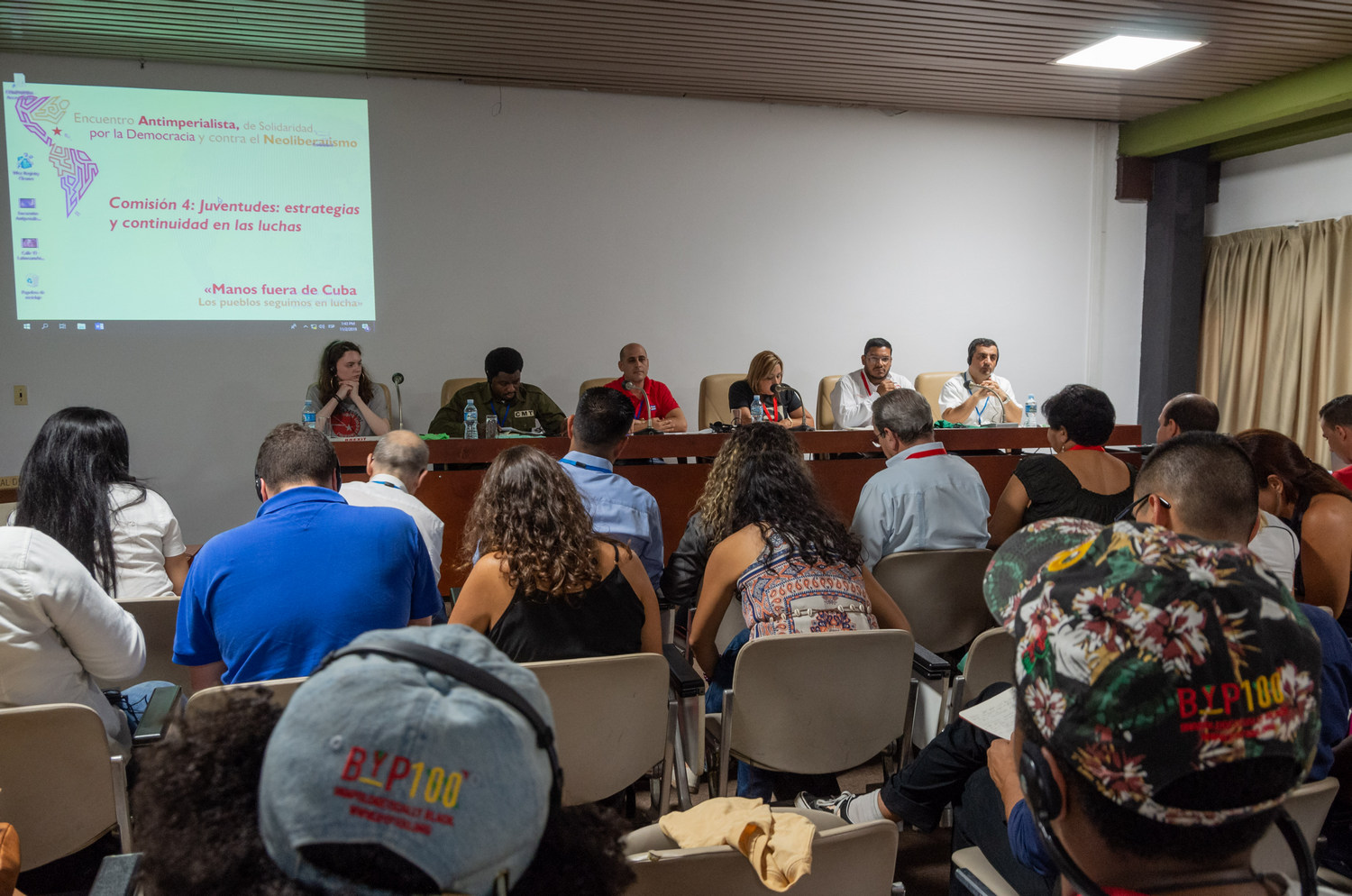 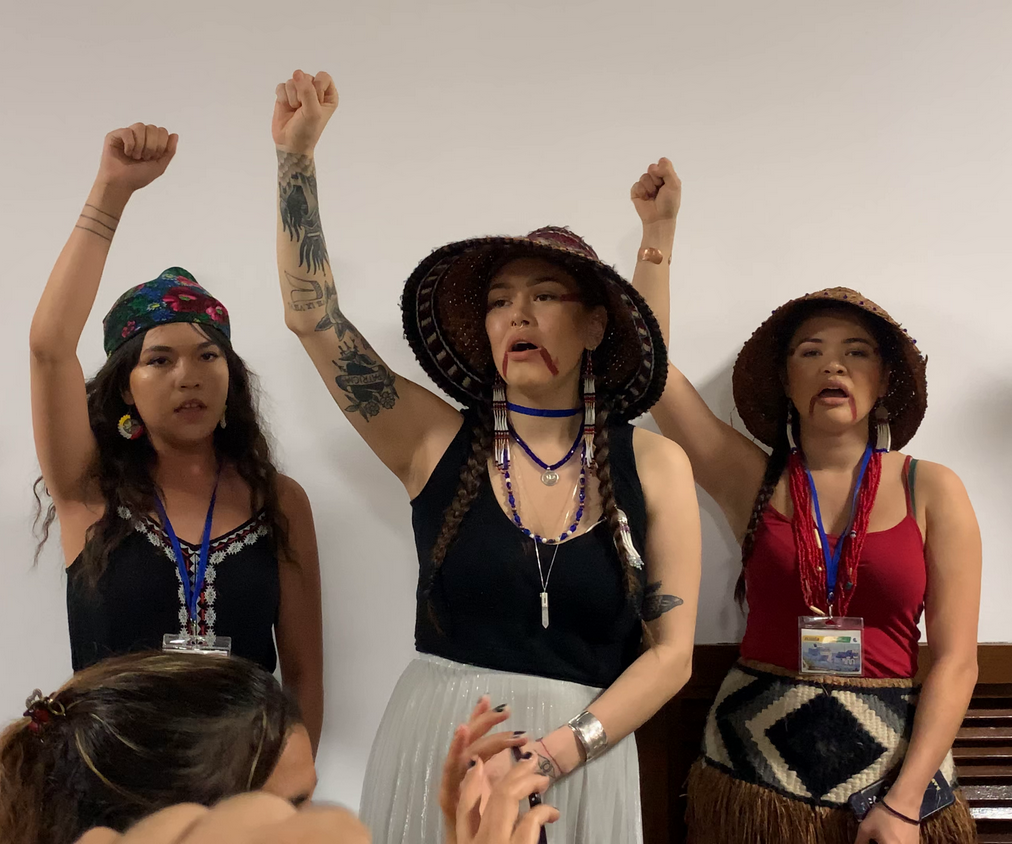
Top: Commission 1 meets at the Latin American School of Medicine;
bottom: meeting of the youth commission, where Indigenous youth from BC
and Manitoba and others intervene from the floor.
Discussions in the Commissions were informative
and raised the many challenges facing the peoples. For instance,
participants from Puerto Rico shared the situation of their country,
the oldest country still under colonial domination. María
Lourdes Santiago, vice-president of the Puerto Rican Independence
Party, in the Decolonization commission, explained in detail the many
problems Puerto Rico faces every day, economically and culturally, but
she also strongly stressed that "after 121 years of domination, we
still speak Spanish" and that after Hurricane Maria, which devastated
the country and in which many lives were lost, the Puerto Rican flag,
their own flag, waved in every corner.
"Puerto Rico is the great debt Latin America still
has with colonialism," she said.
Solidarity with the cause of the Venezuelan
people, demand for the return to Argentina of the Malvinas occupied by
Britain, and independence for Guadaloupe, occupied by France, as well
as solidarity with the struggles of the Chilean, Bolivian, Honduran,
Salvadoran, Nicaraguan, Sahrawi and Palestinian peoples were also
expressed on numerous occasions throughout the event.
One of the highlights of the Anti-Imperialist
Forum was the announcement that more than two million signatures had
been gathered in Cuba in just 14 days demanding the freedom of former
Brazilian president Luis Inácio Lula da Silva, imprisoned
arbitrarily and unjustly by the current neo-liberal president through
the manipulation and corruption of legal proceedings.
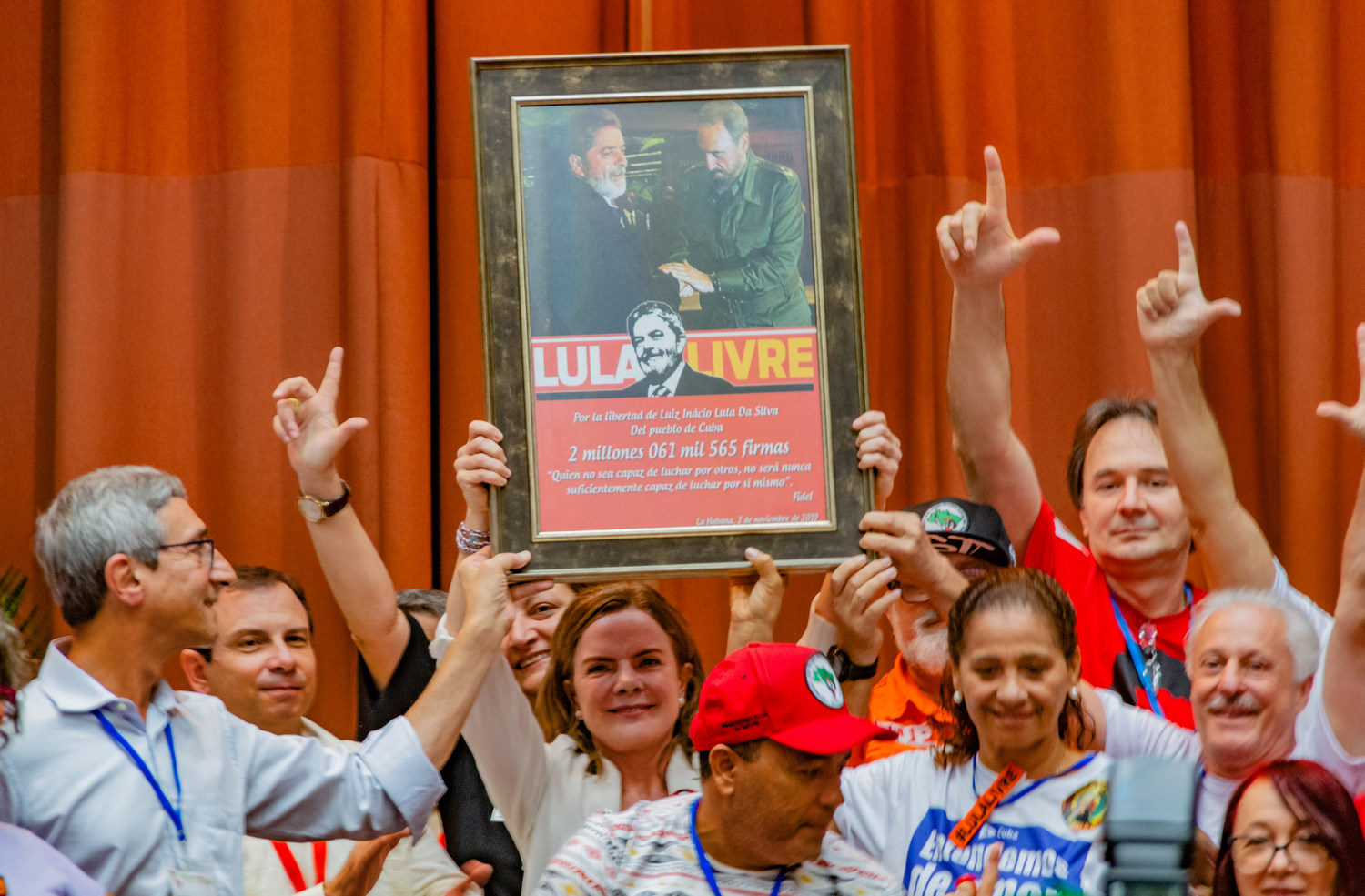
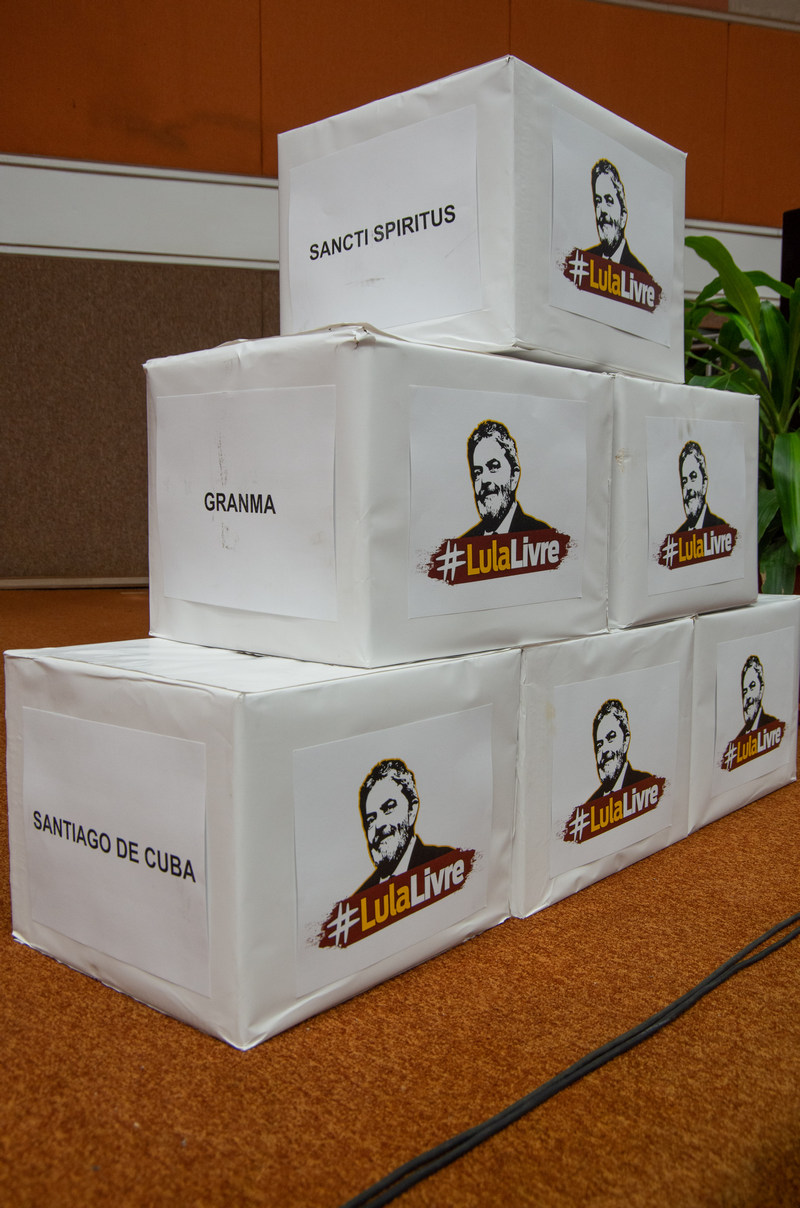 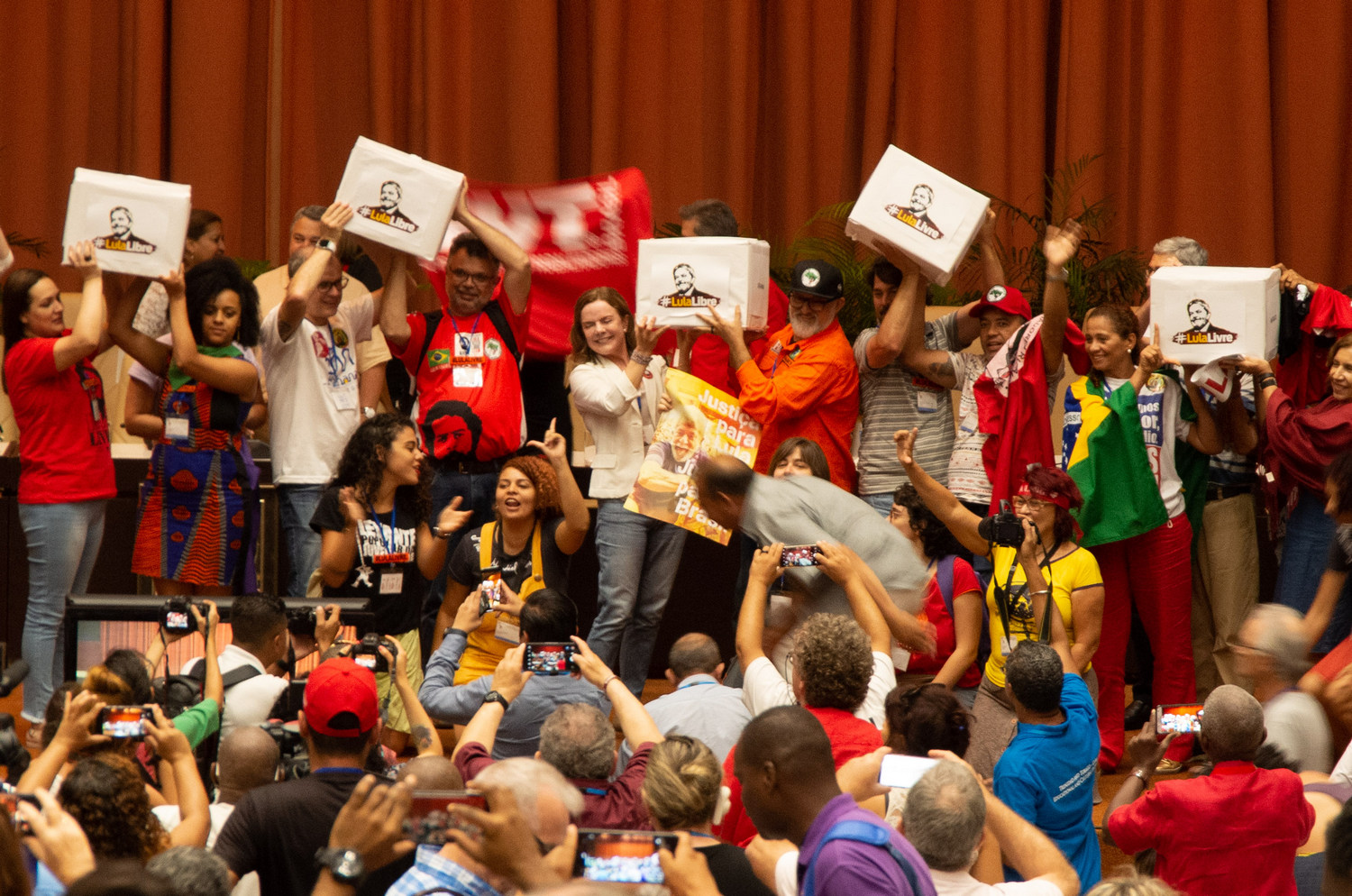
Signatures were also gathered in the agora outside
the Convention Centre.
The letter highlighted that solidarity with Cuba,
"in every stage of the Revolution, was a duty of every man committed to
democracy and the peoples' sovereignty, in the struggle against
neo-liberalism and the perverse blockade imposed by the U.S. government
on the island for more than half a century."
Chants of "Lula Livre!" accompanied the
proceedings from start to finish.
Great enthusiasm was also expressed for Cuban
solidarity actions with the world, sending doctors to every corner
where they are needed, to those who do not have any other access to
medical care. There was a standing ovation for these doctors, some of
whom were present at the conference, either invited to participate
especially or as delegates from their own countries. This was a special
moment in light of smear campaigns the U.S. is carrying out against
them and their missions.
Day Three of the Gathering

The day started with reports from the Commissions,
the presentation of the text of the final declaration and interventions
from many delegates and the adoption of the declaration.
In the afternoon, the concluding session of the
Anti-Imperialist Solidarity Conference, for Democracy and Against
Neo-Liberalism began with the resounding applause and standing ovations
that greeted the arrival of Army General Raúl Castro Ruz,
First Secretary of the Communist Party of Cuba; President Miguel
Díaz-Canel Bermúdez; President Nicolás
Maduro of the Bolivarian Republic of Venezuela; José
Ramón Machado Ventura, Second Secretary of the Communist
Party of Cuba; and Esteban Lazo, President of the National Assembly of
People's Power and the Council of State.
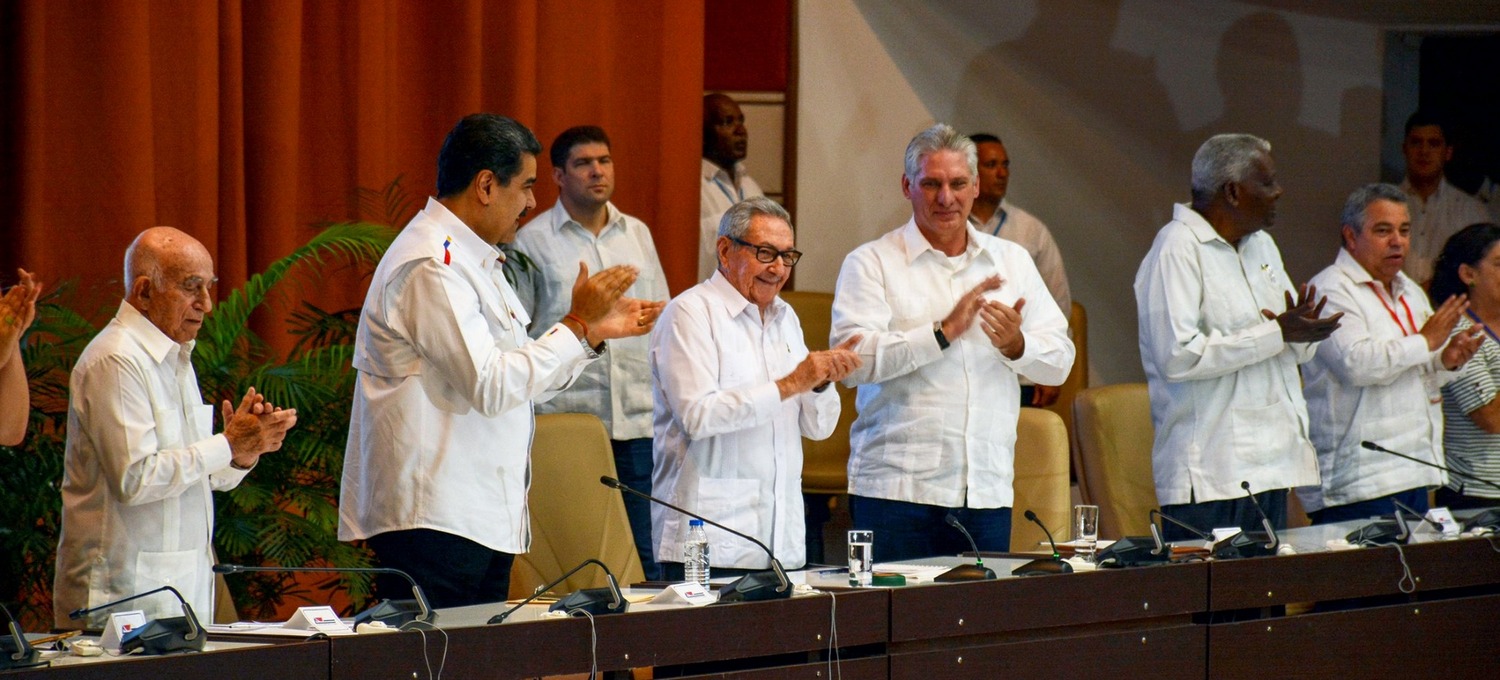
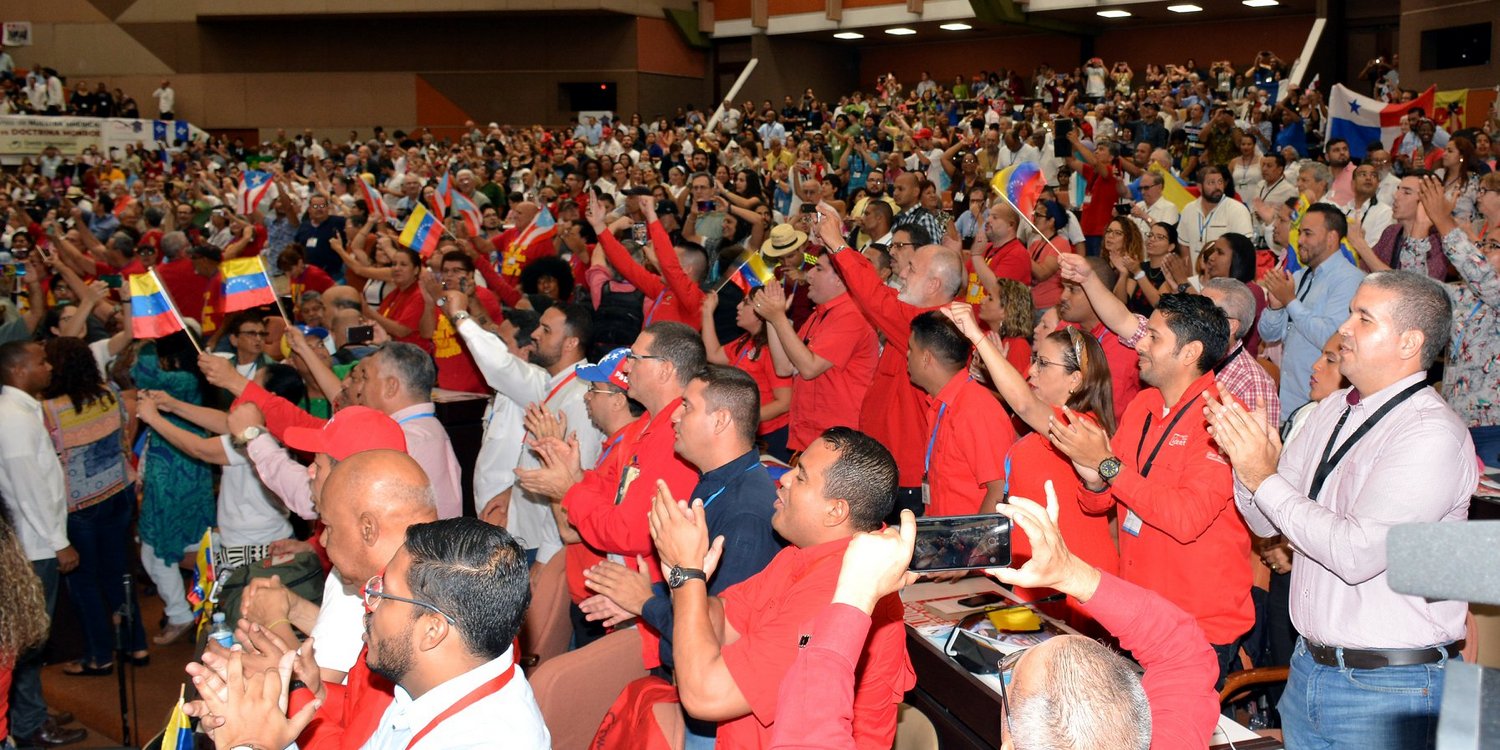
A Declaration of Solidarity with Cuba was read by
Gail Walker, Executive Director of the U.S.-based Interreligious
Foundation for Community Organization (IFCO)-Pastors for Peace, and
daughter of reverend Lucius Walker, who in 1992 started the caravans of
Pastors for Peace to Cuba.
"We support the construction of a prosperous Cuba,
based on José Martí's principle of who rises
today with Cuba, rises for all times," read the declaration, which also
demanded the end of the blockade against Cuba and repudiated the
implementation of the Helms-Burton
Act.
Walker had expressed earlier that as part of the
people of the U.S., they felt an even higher commitment with Cuba.
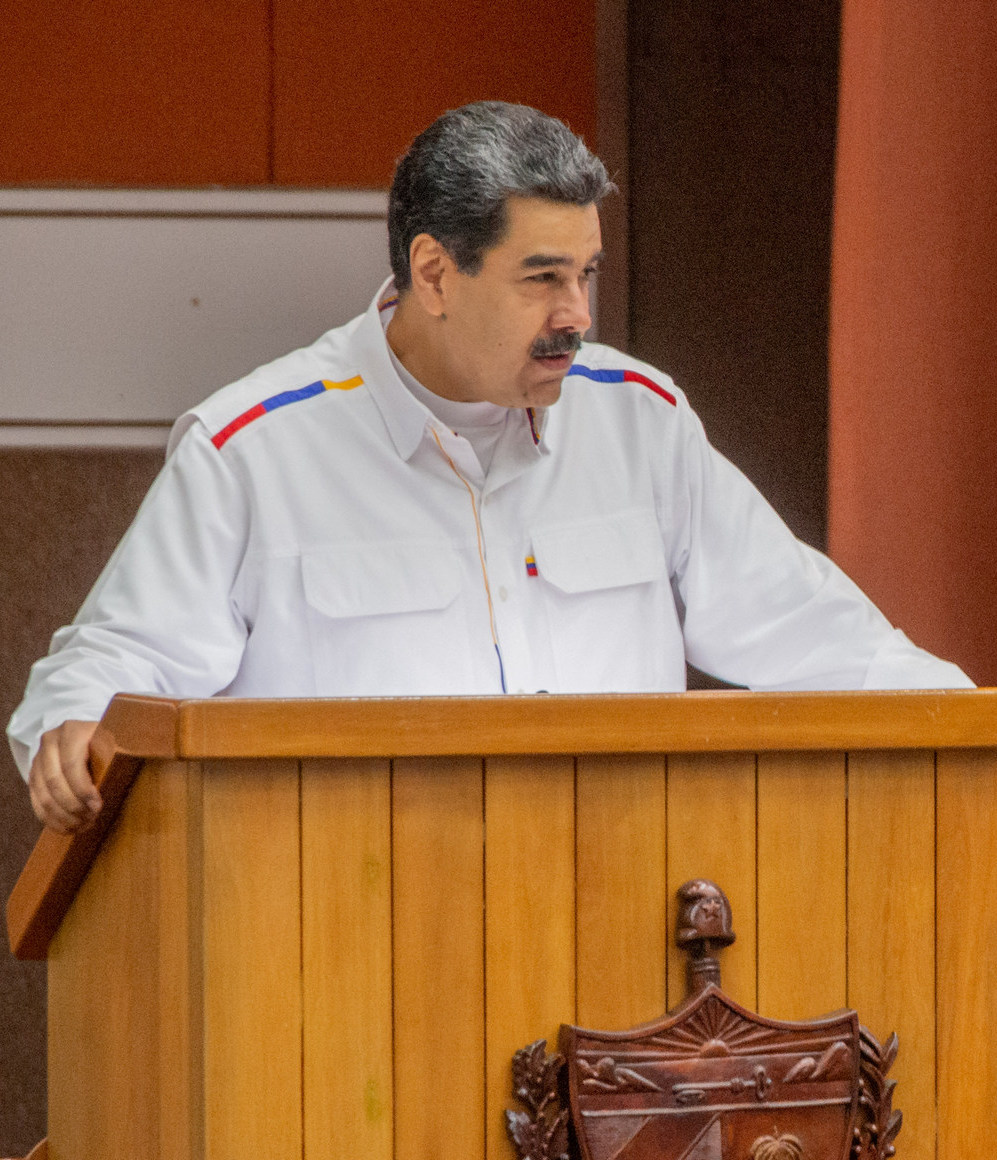 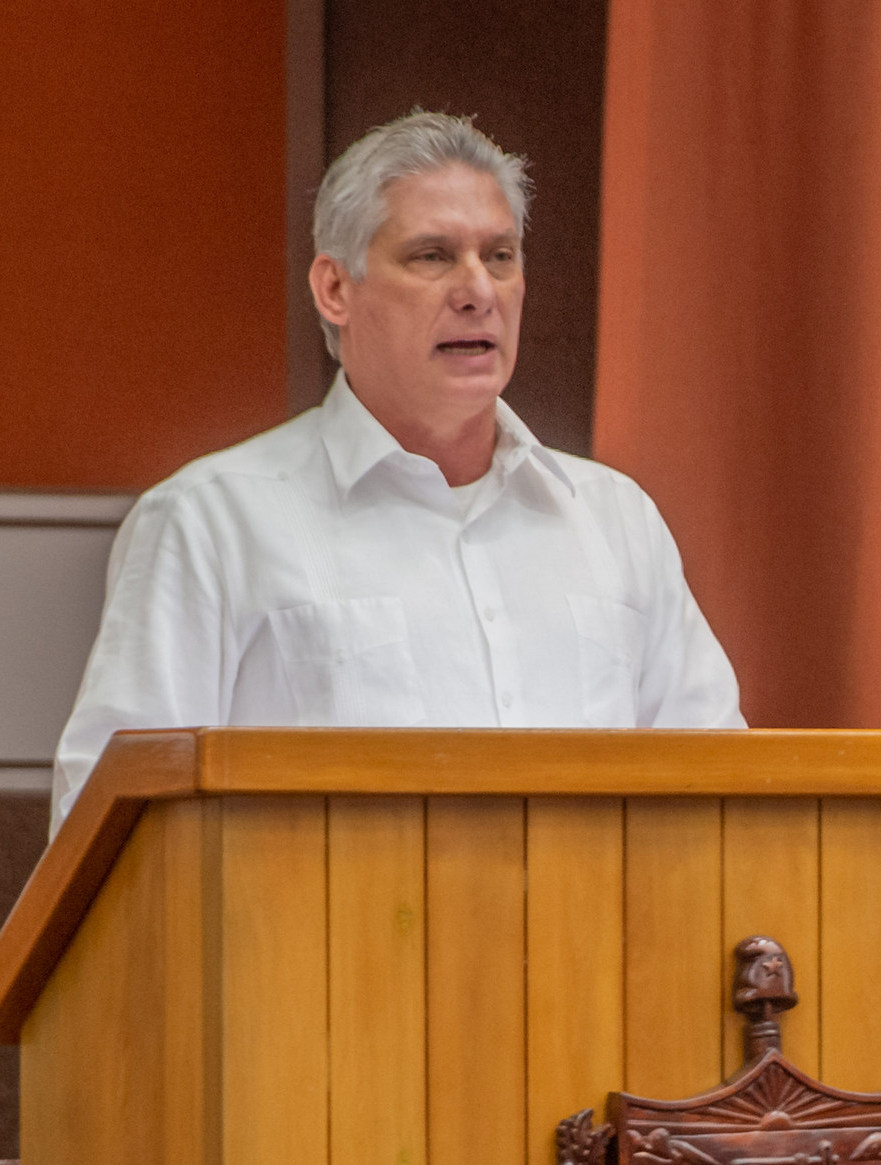
Venezuelan President Nicolás Maduro and Cuban President
Miguel Díaz-Canel Bermúdez
address the closing session.
President Maduro spoke next. His speech expressing
the defiance of the Venezuelan people to the hostile actions of the
United States was met with prolonged applause and a standing ovation.
President of the Republic of Cuba Miguel
Díaz-Canel Bermúdez then gave the concluding
speech of the event. He began his remarks, "A special greeting to all
who resist and have come to the Cuban capital, which has always been,
and will be, a meeting point for those who defend peace and solidarity
among peoples."
"The new generation of Cuban leaders, trained and
educated by the historical generation of Fidel and Raúl, are
revolutionaries, socialists, faithful to Fidel and Martí,"
he said to prolonged applause. "[W]e will not yield a millimetre in our
positions in favour of independence, sovereignty and social justice.
And as a link with the peoples who struggle and resist, we will always
uphold solidarity as a fundamental principle, to which we owe so much,"
he added.
It was without a doubt an end which forged a new
beginning. Invigorating and optimistic, there was a certainty that Cuba
is not alone and, also, a consciousness in Latin America and
the Caribbean that the peoples preserve the peace and solidarity to
achieve a more prosperous region; a region that puts an end to all the
various forms of colonialism still existing, a region of people's
democracy and against neo-liberalism. Anti-Imperialist unity is without
doubt the key to victory.
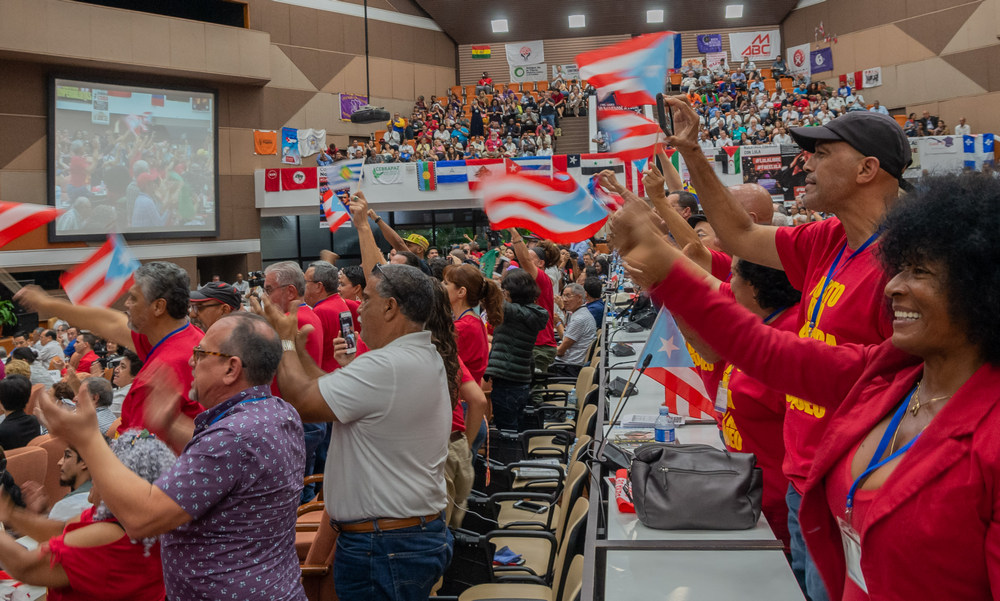

Final Declaration
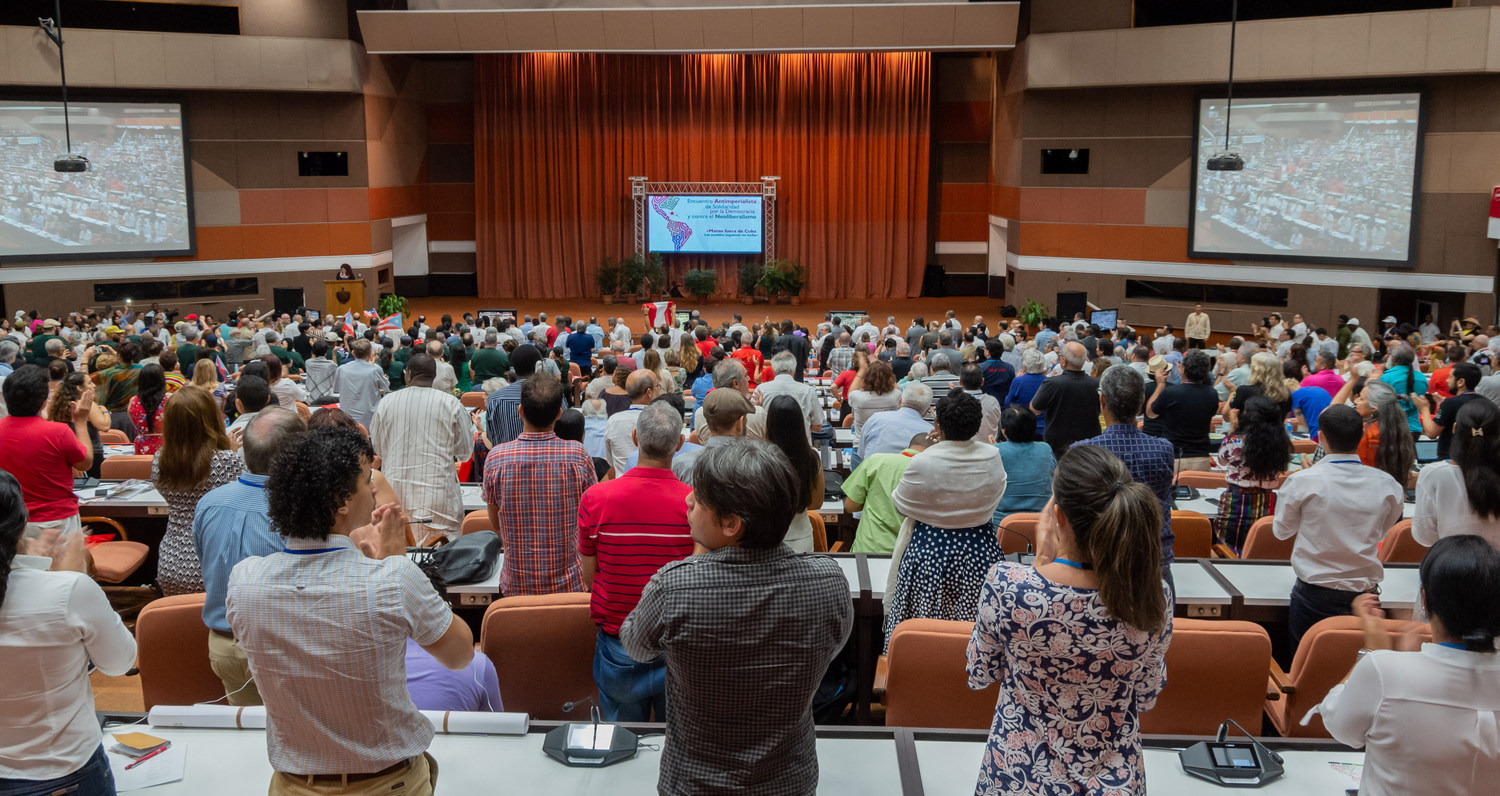
From this Cuba with such solidarity, the first
free territory in the Americas, recognizing the heroic resistance of
its people and the victories attained over sixty years of Revolution,
we have shared our struggles and hopes, we the 1332 representatives of
789 social and people's movement organizations, of solidarity
movements, networks, platforms and regional and global organizations,
of political parties, parliamentarians, religious groups and
intellectuals from 86 countries.
We come from every corner of the world, with a
long history of solidarity actions facing imperialist aggression
against the Cuban Revolution, committed to all just causes and as part
of the efforts for unity in action and coordinated struggle, to meet
here in Havana at the Anti-Imperialist Solidarity Encounter, for
Democracy and against Neo-liberalism, from the first to the third of
November of 2019.
We are experiencing a new moment in history.
People casting their ballots, people in the streets and on the social
networks demonstrating with their votes and protests, the waning of the
oligarchic right-wing's conservative imperial offensive and neo-liberal
restoration in alliance with religious fundamentalism, media power
capital and transnational enterprises that, in the hands of predatory
U.S. imperialism, excludes broad sectors of the population, destroys
honest work, life in harmony with nature and places the human species
at risk.
The peoples are demonstrating that it is indeed
possible to overthrow the imperial offensive which aims to resort to
criminalization of social protest, the confinement and displacement of
populations, the murder of social and political leaders, femicide, the
persecution of the leaders of progressive governments and the
judicialization of politics.
Times of hope have opened up. Unity is vital and
constitutes our duty; mobilization is the order of the day;
organization of the people is the imminent task; and integration is the
strategy that will lead us on to victory.
At this crucial time, we agree to:
1. Take on our Declaration of
Solidarity with Cuba approved at this Encounter, mobilizing in
permanent actions which are intensive, systematic and which have high
media impact against the escalated aggression of the Yankee Empire, as
part of the "Hands off Cuba" international campaign.
2. Demand lifting the
strengthened, criminal and genocidal economic, commercial and financial
blockade imposed on Cuba by the U.S. government, and to support the
Resolution to be presented at the United Nations General Assembly on
the 6th and 7th of November of 2019, confident of yet another
overwhelming victory for the international community.
3. Denounce the different
kinds of threats and aggressions on all sovereign governments that
refuse to serve the hegemonic power that seeks to install military
bases in their territories and usurp their strategic resources.
4. Reaffirm and defend the
validity of the Proclamation of Latin America and the Caribbean as a
Zone of Peace.
5. Denounce the grave risks in
store for Latin America, the Caribbean and the world, the decision to
activate the Inter-American Treaty of Reciprocal Assistance (TIAR in
its Spanish language acronym) oriented towards militarily backing the
U.S. government's zeal to revive the Monroe Doctrine.
6. Express our steadfast
solidarity with the Bolivarian and Chavist Revolution, the
civilian-military union of the people and their legitimate President,
Nicolás Maduro Moros, who has steadfastly defended
Venezuela's sovereignty from all types of aggression by the United
States government and its allies taking measures against the true
diplomatic representatives of the Venezuelan government. Support the
dialogue with sectors of the opposition to maintain peace in Venezuela.
7. Intensify our mobilization
in the demand for the immediate freedom of comrade Luiz
Inácio Lula Da Silva, victim of lawfare, which has as its
aim the persecution and incarceration of left-wing political and Latin
American progressive leaders.
8. Congratulate the people of
the Plurinational State of Bolivia for their electoral victory and
President Evo Morales Ayma on his re-election, as a result of measures
benefitting the people and economic growth. Likewise, we
denounce the attempts at coup d'états and
destabilization unleashed by sectors of the opposition, instigated by
the United States, against peace and public safety in Bolivia.
9. Condemn the attempts of the
U.S. administration to destabilize the
government of Nicaragua and reiterate the right of its people to Peace.
10. Demand independence for
Puerto Rico, a Latin American and Caribbean nation submitted to over a
century of U.S. colonial domination, where its people victoriously
rally in the streets against annexionist government policies.
11. Express our steadfast
solidarity with the nations of the Caribbean in their legitimate claim
for reparations for the repercussions of slavery, and for the fair and
differential treatment in dealing with climate change, according to
their special circumstances and their situation of greater
vulnerability.
12. Support the historic
demand of the Argentinian people to recover the Malvinas Islands,
territory which legitimately belongs to them.
13. Denounce those governments
that, following the dictates of Yankee Imperialism and the recipes of
the International Monetary Fund, violently impose their neo-liberal
shock policies on their peoples, deepening social injustice and
especially affecting the most vulnerable sectors in society.
Energetically condemn the use of force and repression to attempt to
crush the just claims of the social and people's movements.
14. Defend the decision of the
people of Chile to bravely revolt in the streets to open the great
avenues against the repressive and anti-popular policies of the
government, and condemn the use of torture, violations, mutilations and
death of Chilean citizens at the hands of the repressive bodies of that
country.
15. Condemn the repression in
Ecuador and the toll in human lives for that brother country which is
dealing with the neo-liberal paquetazo.
16. Reject the pro-imperialist
government of Jair Bolsonaro, subservient to the interests of the
United States and engaged in reversing the advances attained in that
sister nation, destroying the processes of integration and all
progressive and left-wing expressions in the region.
17. Support the right of the
Colombian people to peace and defend the full implementation of the
Final Agreement to achieve it, demand that the government respects the
lives of former combatants and political and social leaders. We call on
the return to the Dialogue Table with the National Liberation Army.
18. Express our deepest
solidarity with the sister people of Haiti in their struggle for social
justice, historic reparations and honorable life.
19. State our support to the
struggle of the people of Honduras and their legitimate revindications.
20. Congratulate the people of
Argentina and their President-elect Alberto Fernández for
the well-deserved victory at the ballot boxes, bringing the defeat of
neo-liberalism and the recovery of hope and dignity for that nation.
21. Commend the government of
Manuel López Obrador and its contribution to the unity of
Latin America and the Caribbean, in defense of the principles of
non-intervention and respect for sovereignty.
22. Express our support and
solidarity with the Frente Amplio of Uruguay which defends the
continuity of the advances attained on behalf of their people in the
last three 5-year terms.
23. Denounce the meddling of
imperialism in the domestic affairs of countries in Africa and the
Middle East, the aggression and wars unleashed, under the so-called
crusade against terrorism, for the control of natural resources in
those regions. Reject the coercive economic measures against Zimbabwe.
24. Support the historic cause
of the struggle of the Sahrawi and Palestinian peoples for their right
to self-determination.
25. Demand the end of
imperialist intervention against Syria and the full respect for its
sovereignty and territorial integrity.
26. Welcome the process of
rapprochement and dialogue between the two Koreas. Condemn
the unilateral sanctions against the Democratic People's Republic of
Korea.
27. Reject all forms of
discrimination and violence on the grounds of gender, skin color,
religious belief, sexual orientation or any other manifestation that
runs counter to the dignity and integrity of persons and to call for
solidarity with their agendas of struggle, and to recognize the
contributions of the women's and feminist movements in the emancipatory
processes.
28. Defend the aboriginal
peoples rights for their culture, territories, traditions and ancestral
customs. Express our support for the Afro-descendant communities and
the minorities in their struggles for their demands.
29. Recognize the protagonist
position and commitment to struggle of the youth as the persons who
will faithfully continue the emancipatory and internationalist legacy
of our forefathers.
30. Strongly condemn the
current anti-immigrant policy of the governments of the United States
and the European Union, as well as of all fascist, xenophobic and
racist manifestations.
31. Denounce the current
McCarthyist crusade of the U.S. government and the anti-communist
campaign occurring in Europe.
32. Call for global struggle
to defend natural resources, biodiversity, food sovereignty and
security, Mother Earth and social conquests and rights.
33. Strengthen the response to
cultural and symbolic warfare whose battleground is the dispute over
the subjectivity of human beings, connecting the media war on the
Internet with the digital social media, feeding the networks of truth
against the offensive of lies spread by neo-liberal imperialism.
Therefore:
We reiterate the importance of moving forward to
build anti-imperialist unity among the left-wing political forces and
the social and people's movements in regard to plurality, diversity and
the sovereign right of the peoples to freely choose their own form of
political, economic and social organization, convinced that unity is
the only route leading to victory in the faceoff with the principal
enemy of the peoples: Yankee imperialism and that of its allies.
We thank the people, the Government of the Island
of Liberty and Unity and the Cuban Chapter of Social Movements for
their hospitality and eternal solidarity. We shall continue at your
side, committed to your social project and with the promise of
divulging the truth about this invincible Revolution.
This Encounter reaffirms the will to fight of our
peoples and constitutes a formidable incentive to continue moving
forward, aware that we shall continue resisting until victory.
Faced with the plans for the disintegration of
imperialism and the conservative, oligarchic and neo-liberal right
wing, we oppose it with the integrating sovereign and honorable plan of
our peoples. Let us unite to demand our right to development, to life
and to the future. Anti-imperialist unity is the tactic and strategy
leading to victory.
Mr. Imperialist: Hands off
Cuba!
We the people continue the struggle!
¡Hasta la victoria siempre!

The Cuban Revolution at 60
-- International Conference, Halifax, Nova Scotia
Halifax Hosts Largest Gathering of
Off-Island Specialists on Cuba
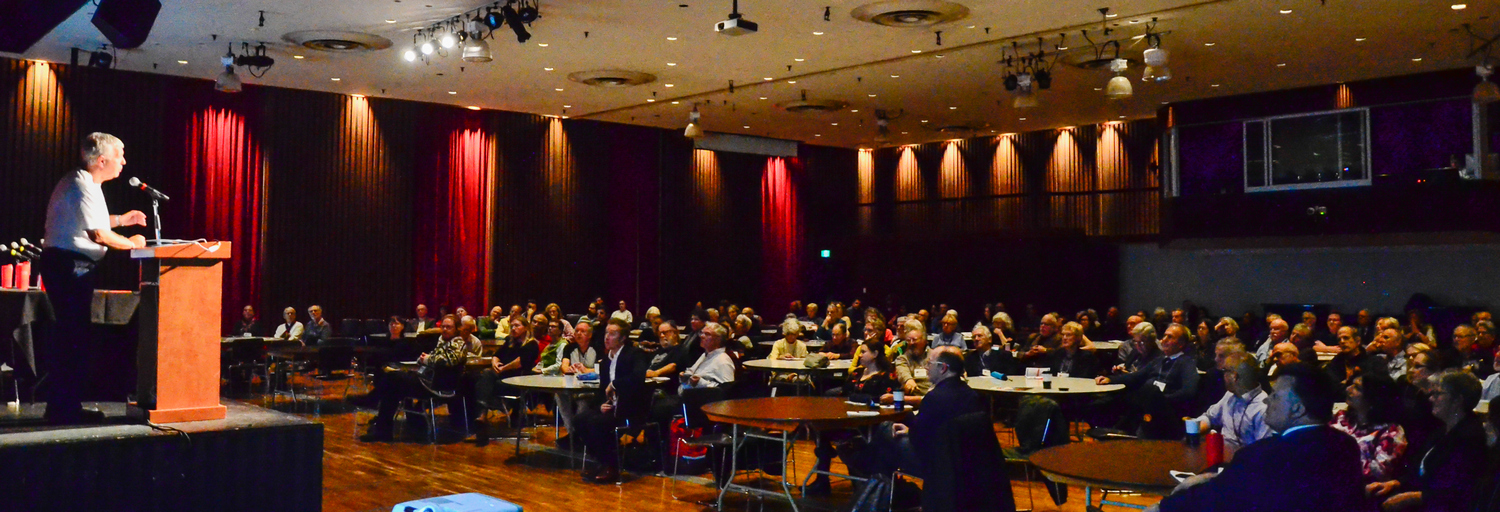
The conference opens on October 31, 2019.
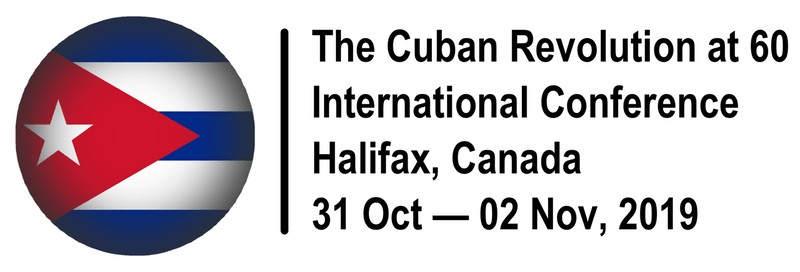 An important three-day international conference
-- The Cuban Revolution at 60 -- was held in Halifax from October 31 to
November 2. Cuban Ambassador to Canada Her Excellency Josefina Vidal,
one of the featured speakers at the conference, noted that it was the
most important such event to take place outside of Cuba. An important three-day international conference
-- The Cuban Revolution at 60 -- was held in Halifax from October 31 to
November 2. Cuban Ambassador to Canada Her Excellency Josefina Vidal,
one of the featured speakers at the conference, noted that it was the
most important such event to take place outside of Cuba.
It was planned by two leading Canadian Cuba
experts at Dalhousie University, Dr. John Kirk and Dr. Isaac Saney.
Previously in 1989, Kirk organized a successful international
conference which took the measure of the Cuban Revolution after its
first 30 years. "This year not only marked the 60th anniversary of the
Cuban Revolution," noted Kirk, "but it was also a time of historic
transformation on the island: leadership change, constitutional reform,
and a complex process of economic developments. This was a good
opportunity to discuss the progress Cuba has made over the past 60
years and perhaps more importantly, to analyze current developments."
Kirk and Saney were supported by a team of
community and student volunteers led by Sheila Savage, Marilyn
MacMullin and Jeanie Kimber who oversaw logistics and venues and made
sure the buses -- and the program -- ran on time. "We couldn't have
done it without them," Kirk explained.
More than 250 people participated. Academics and
experts from Cuba, Canada, Mexico, Britain and the U.S., as well as
students, community activists and friends of Cuba all contributed to
the success of this historic conference.
Forty leading Cuba specialists from Cuba, the UK,
Latin America, Europe, the United States and Canada took part in a
series of panels to assess the successes and challenges of the Cuban
economy, Cuba-U.S. relations and Cuba's international relations. Other
panels focused on climate change and ecological challenges facing the
island, as well as social change, including issues of race, gender
(in)equity, health and sexual diversity. The panel discussions,
keynotes, and informal exchanges between the participants assessed the
successes and challenges of the Cuban revolution and socialist system
and the challenges that lie ahead (see reports below).
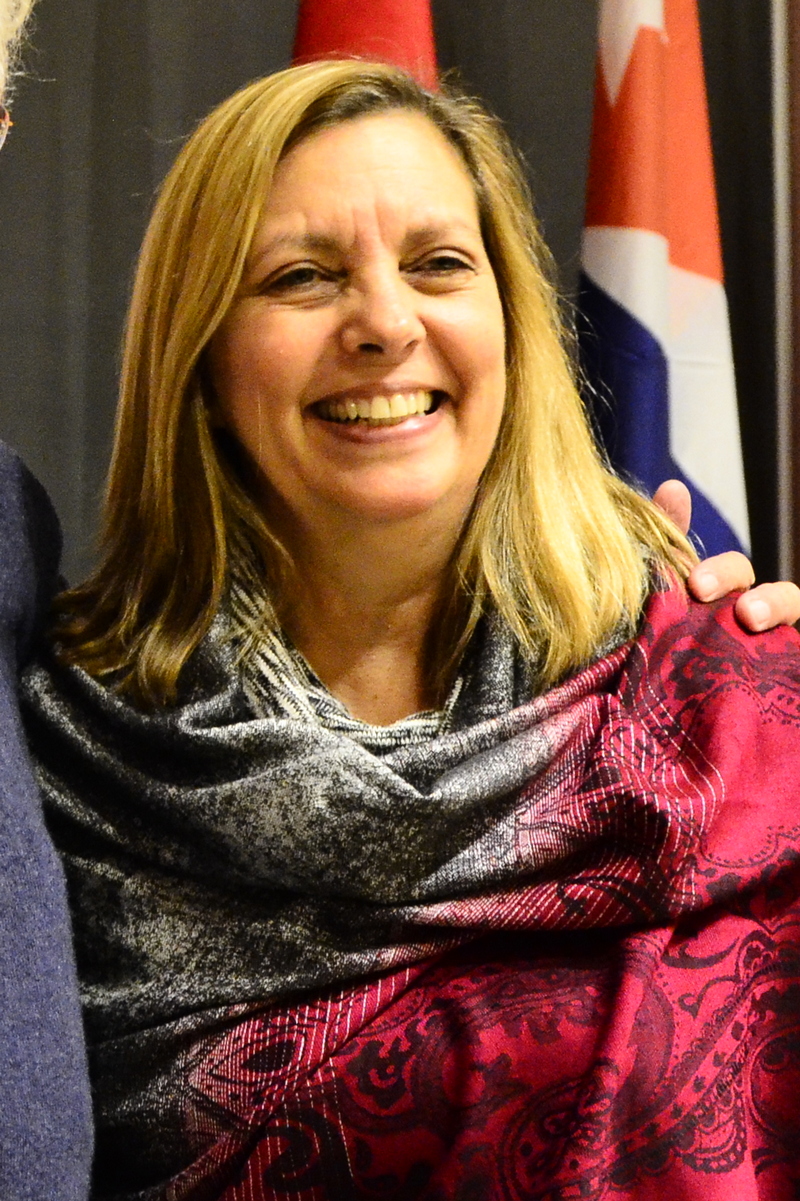  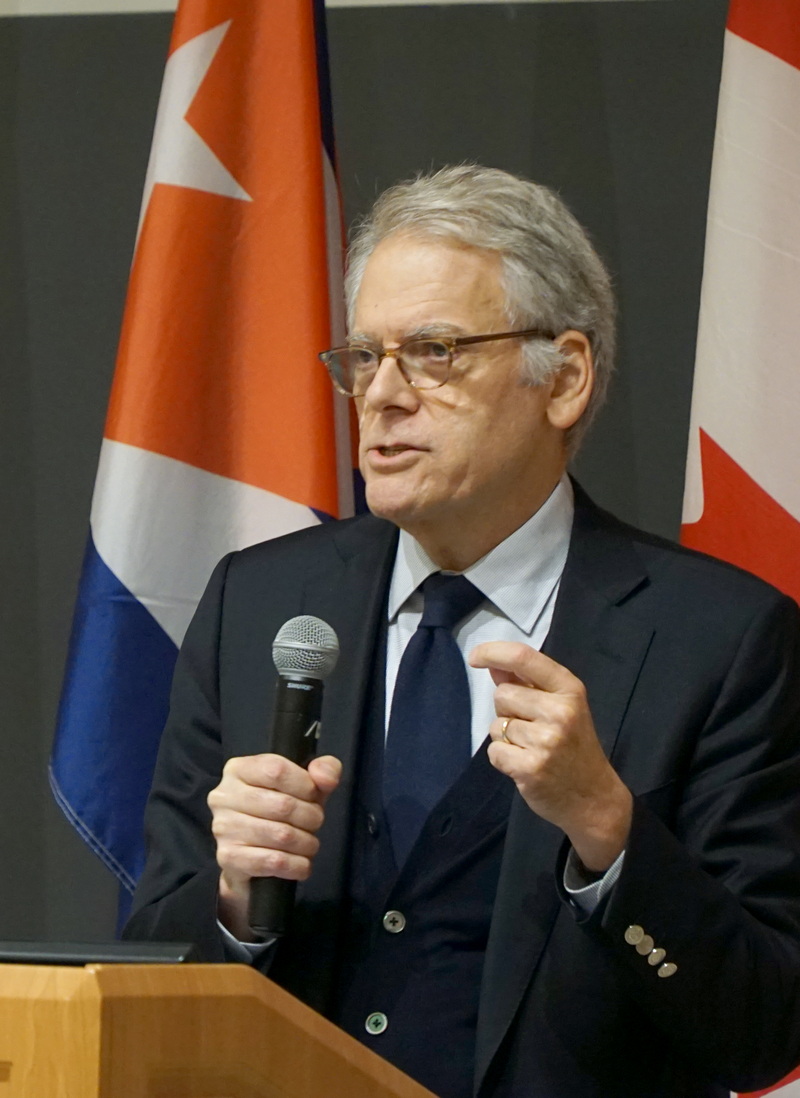
Key presentations at the conference were
delivered by (left to right) H.E. Josefina Vidal, Cuban Ambassador to
Canada; Dr. Alon Friedman, neuroscientist at Dalhousie University Brain
Repair Centre; and Jeffrey DeLaurentis former U.S. Ambassador to Cuba.
The first day of the Conference began with a
message of greeting from Halifax Mayor Mike Savage. In his message,
Mayor Savage expressed his admiration for Cuba and also the deep ties
between Cuba and Nova Scotia which have been mutually beneficial, and
which he hoped would continue and deepen.
This was followed by the opening panel, entitled
"Cuba and the Cuban Revolution: Overview and Personal Reflections."
On the second day, November 1, the panels
discussed the evolution of the Cuban revolution over 60 years, climate
change and how Cuba is addressing this issue, and how Cuba is adapting
to social change to ensure the rights of its citizens moving forward.
The second day also featured a much anticipated
keynote address on the so-called "Havana Syndrome" by Dr. Alon
Friedman, a medical doctor and researcher at Dalhousie University, who
led a team of researchers funded by Global Affairs Canada to
investigate the cause of the symptoms reported by U.S. and Canadian
diplomats in Havana in late 2016. Without any evidence, the Canadian
government had already blamed the Cuban government. This keynote was
the first time Dr. Friedman publicly presented the findings of this
investigation (see report below). The problem was not some "sonic
attack" by the Cuban state, which was the disinformation spread by the
imperialist media and, according to Dr. Friedman, blown out of
proportion. Dr. Friedman remarked on the full co-operation provided by
the Cuban Ministry of Health and expressed the hope that the working
relations established between Canadian and Cuban researchers will
continue.
In the discussion to end the first day's
proceedings the main points brought out are that the Cuban revolution
at the end of 60 years is renovating itself, particularly on the
economic front, in the present conditions. The social solidarity of the
people is constantly being strengthened, both within Cuba and through
Cuba's internationalism.
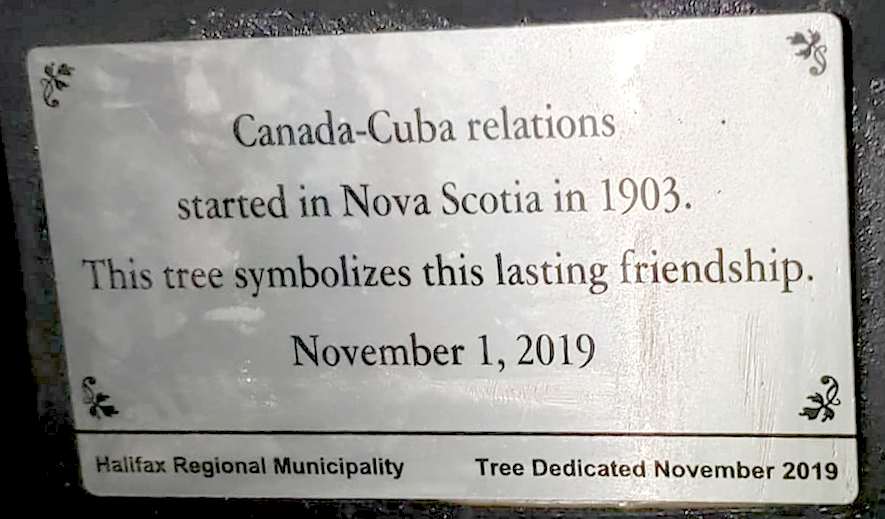 The day's
events were followed by a evening reception on November 1 at Halifax
City Hall hosted by the Nova Scotia Cuba Association (NSCUBA), a
community organization working for the past 30 years to build ties with
Cuba, as well as a tree-planting ceremony where Halifax Mayor Mike
Savage and Ambassador Vidal toasted the long and productive ties
between Nova Scotia and Cuba. The relations between Nova Scotia and
Cuba go back to 1903, when the first Cuban embassy was opened on
Canadian soil in Yarmouth, Nova Scotia, to facilitate trade in the
fisheries. The day's
events were followed by a evening reception on November 1 at Halifax
City Hall hosted by the Nova Scotia Cuba Association (NSCUBA), a
community organization working for the past 30 years to build ties with
Cuba, as well as a tree-planting ceremony where Halifax Mayor Mike
Savage and Ambassador Vidal toasted the long and productive ties
between Nova Scotia and Cuba. The relations between Nova Scotia and
Cuba go back to 1903, when the first Cuban embassy was opened on
Canadian soil in Yarmouth, Nova Scotia, to facilitate trade in the
fisheries.
The major topics addressed the third day of the
conference were the Cuban economy, U.S.-Cuba relations, Cuba's
international relations, and a closing panel looked at the future. As
well, the keynote speech was given by former U.S. Ambassador to Cuba
Jeffrey DeLaurentis.
The panel discussion on the Cuban economy brought
out that the economy has always faced great difficulty as a result of
the U.S. economic blockade and sanctions.
This was followed by a panel discussion that
focused on U.S.-Cuba relations, highlighting the ability of the Cuban
people to withstand the U.S. pressure on the country for over 60 years.
Developing on this theme, in the keynote
presentation, Jeffrey DeLaurentis spoke candidly of his time as lead
negotiator for the U.S. side during the Obama presidency, and the huge
efforts put into normalizing relations between the U.S. and Cuba. He
stated that once the announcements were made by the presidents of Cuba
and the U.S. on December 17, 2014 to normalize relations, he and his
counterpart, Josefina Vidal, worked hard to complete 23 agreements and
launch 17 dialogues on topics are varied as human rights and properties
that were expropriated by the revolutionary government in Cuba.
DeLaurentis underlined that when the new Trump government came into
power this work was stopped and today U.S.-Cuba relations are at an
all-time low. Still, he expressed confidence that the negotiations
marked a turning point. And given the broad support for engagement with
Cuba among members of the U.S. administration, the Pentagon, and people
in the U.S., Mr. DeLaurentis said he hopes that in the not too distant
future, Cuba and the U.S. will achieve normalized relations to the
benefit of both peoples.
The final panel discussion looked at Cuba's
ongoing survival, its development and defence of its sovereignty.
The conference concluded with congratulations to
all the organizers, who were roundly applauded for putting on a timely
and important event and urged to organize another in the near future.
The conference website -- cuba60.ca
-- was created and managed by yet another Canadian Cuba specialist,
Mark Rushton. Now that the conference is over, the website will
continue to host and make publicly available for the next year many of
the papers and presentations delivered during the conference.
A number of scholarly books are also expected to
be published out of the conference.
Support for "The Cuban Revolution at 60"
conference was provided by the Ford Foundation, the Christopher
Reynolds Foundation, the Social Sciences and the Humanities Research
Council, the Washington Office on Latin America, Dalhousie University,
the Canadian Union of Postal Workers, Saint Mary's University, the
Office of the Mayor of Halifax, the Canadian Network on Cuba, Dalhousie
Global Health and NSCUBA, among others.
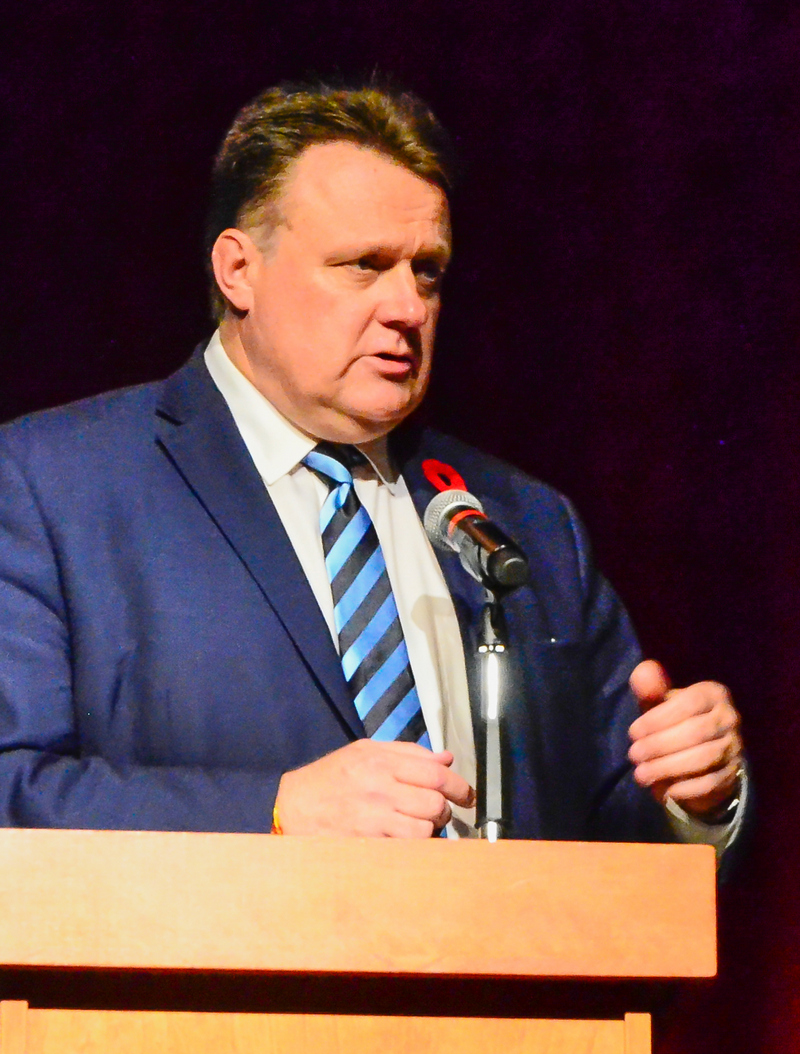 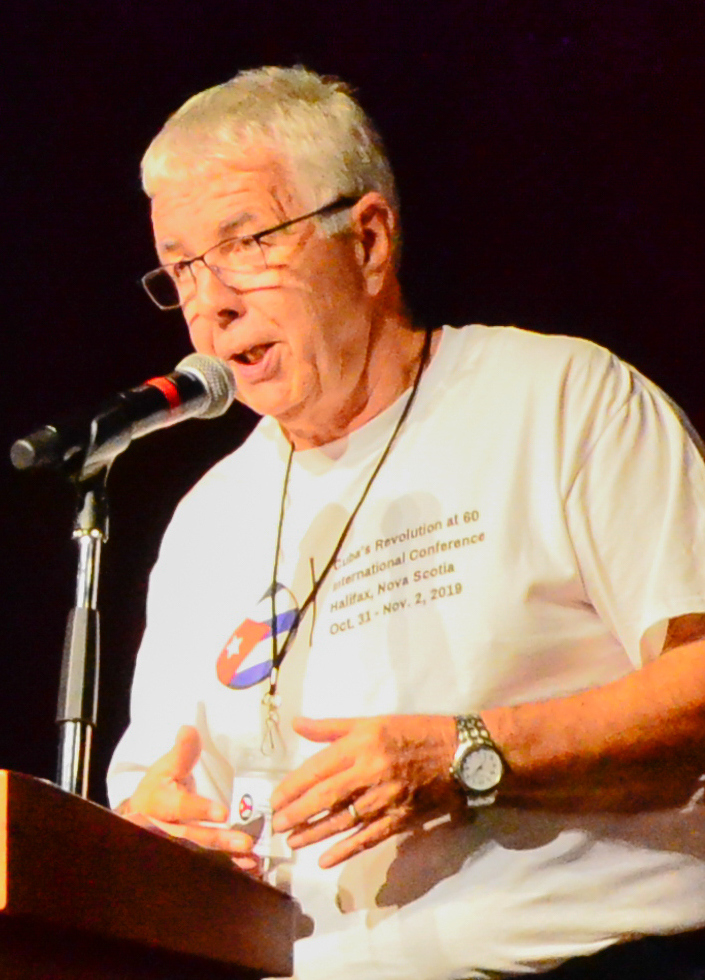 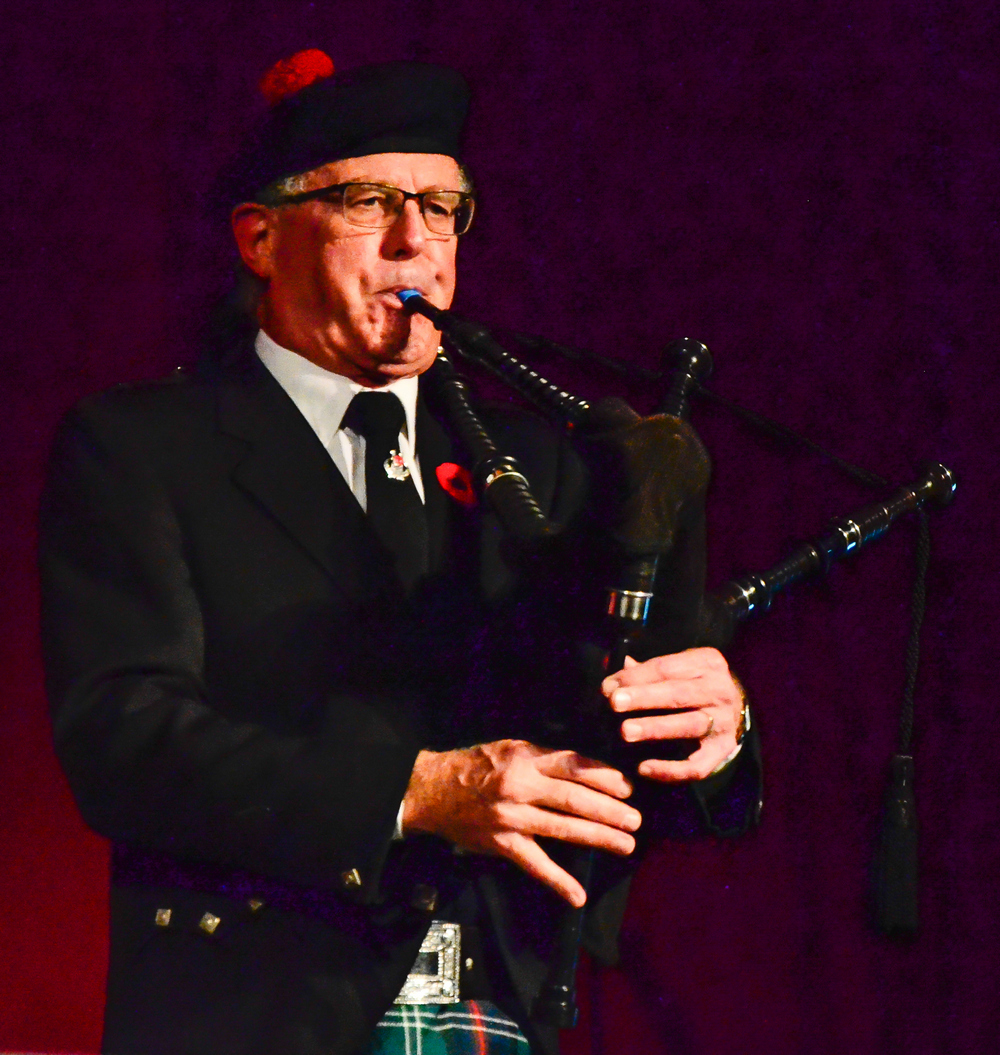
The opening of the conference, featuring (left to right) remarks
from Halifax Mayor Mike Savage, conference organizer Prof.
John Kirk and and a bagpipe greeting.
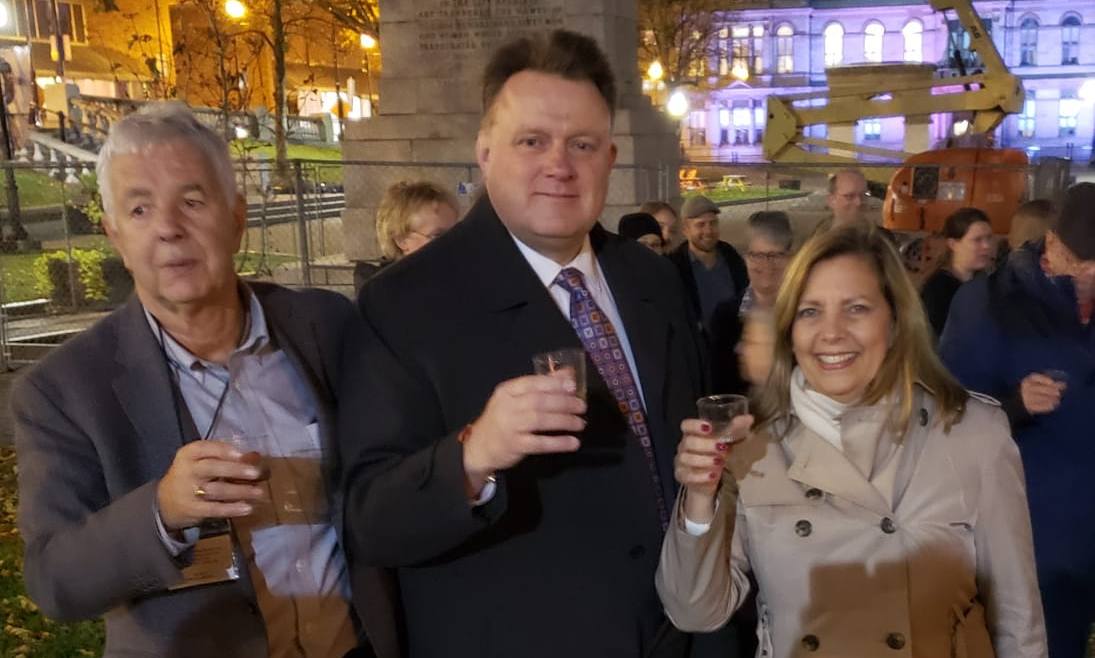 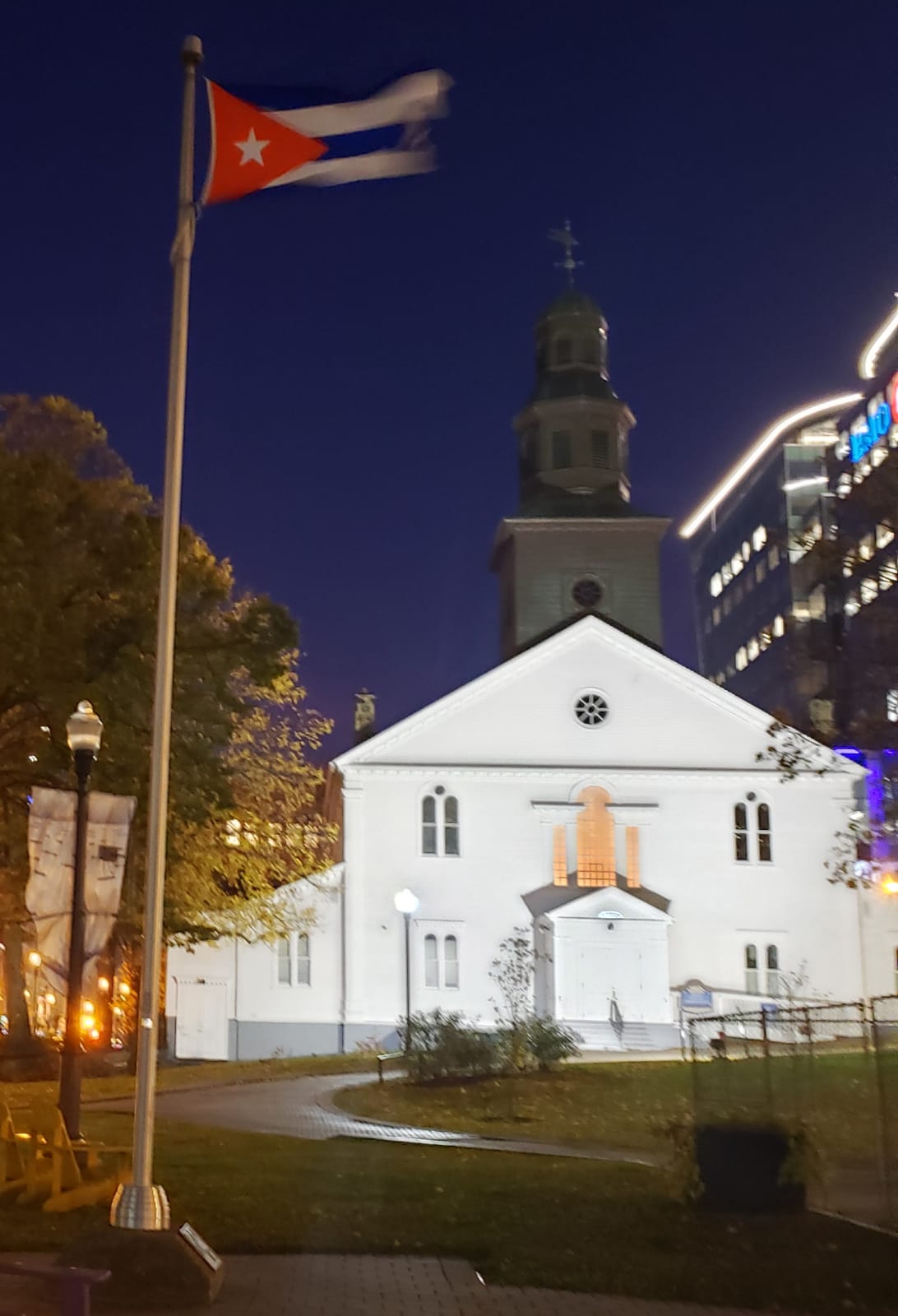
Prof. John Kirk, Mayor Savage and Ambassador Vidal toasting the
longstanding friendship between Nova Scotia and Cuba, November 1, 2019.
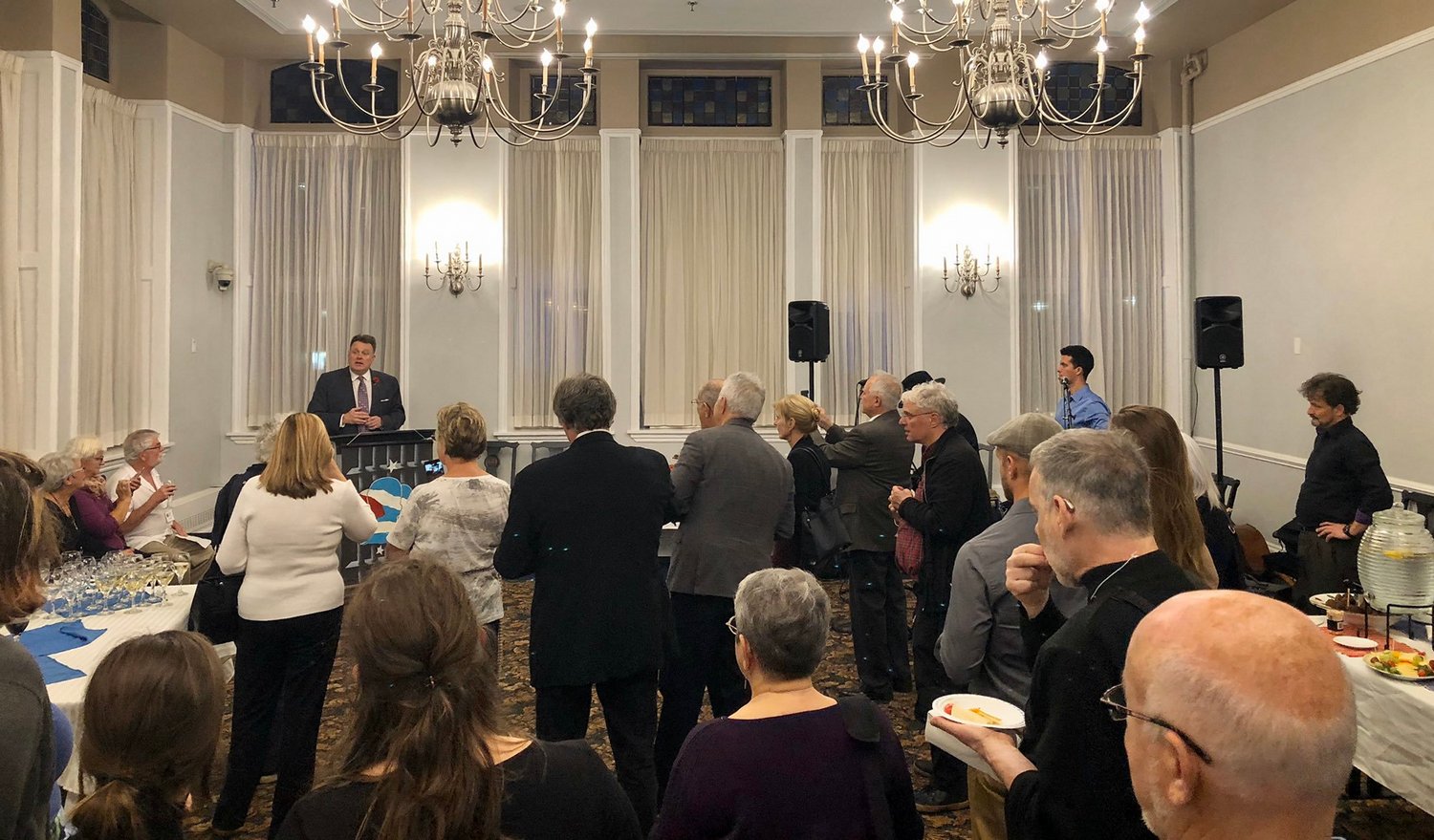 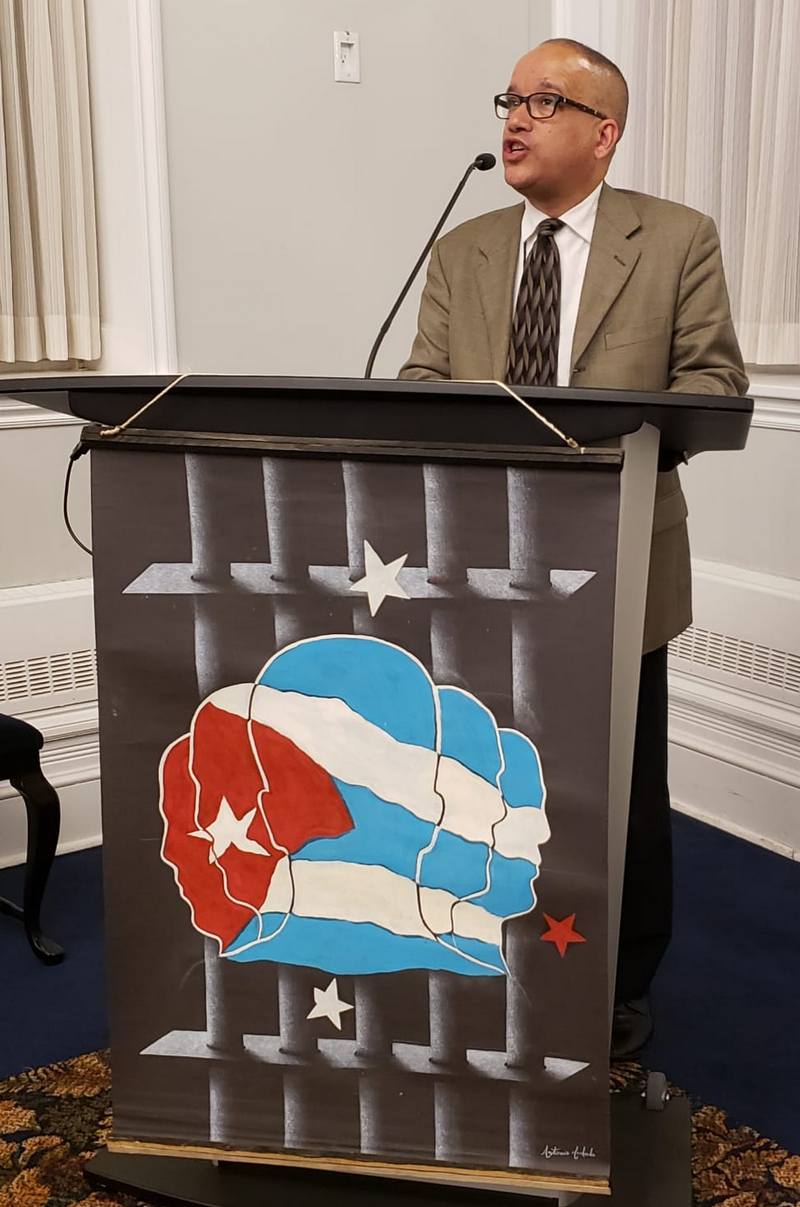
Reception at Halifax City Hall, November 1, 2019. Right: Conference
organizer Prof. Isaac Saney addresses the reception.

Lead Negotiators Look Back on Attempt to
Normalize U.S.-Cuba Relations
Jeffrey DeLaurentis, the ambassador to Cuba
designated by the Obama administration, was intimately involved in the
two-year process that led to the normalization of relations between the
United States and Cuba under that administration. He offered his
personal reflections on that experience during a keynote address to
"The Cuban Revolution at 60" conference held in Halifax. He recalled
that, the early afternoon of June 16, 2017, he sat in his office in
Havana and watched TV as recently elected U.S. president Donald Trump
ripped up what he called the Obama administration's "terrible and
misguided deal with the Castro regime."
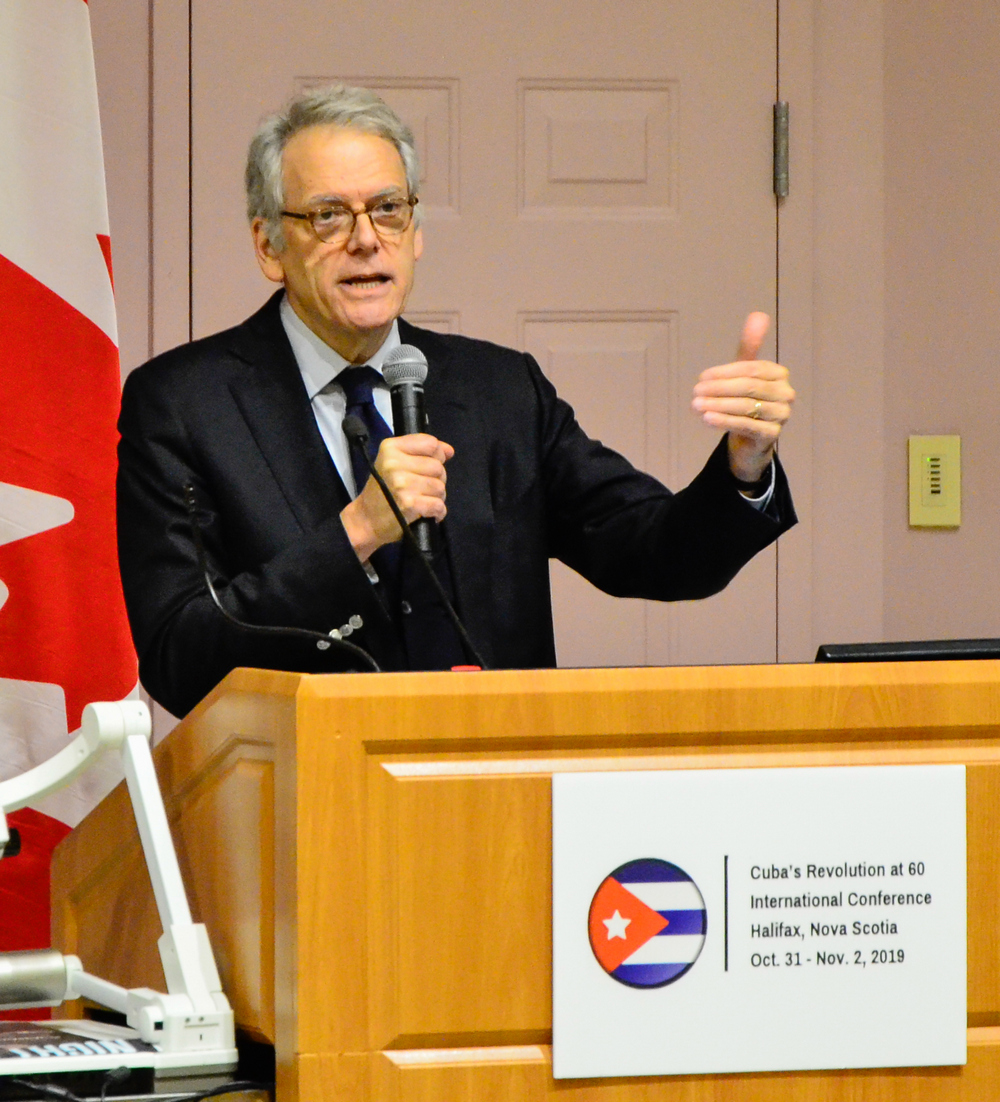 DeLaurentis
remembers "watching all our hard work evaporate. And I knew in my gut
it was going to get much worse." DeLaurentis
remembers "watching all our hard work evaporate. And I knew in my gut
it was going to get much worse."
Twenty-one days after Trump's speech in Miami,
DeLaurentis left Cuba. As he made his way through a reception line of
the embassy's household staff, he recalls that, "after shaking the
first hand," he broke into tears. While he acknowledges it wasn't "very
diplomatic" of him, he notes that, after six months of stoically
watching the new U.S. government dramatically reverse course on Cuba,
"I could no longer hold in my reaction."
It had been a long journey from December 17,
2014, when DeLaurentis delivered the news to 50 embassy staff that --
after 18 months of secret negotiations -- Washington and Havana had
agreed to try to develop a new, less hostile relationship with one
another. "The applause" that day, he says now, "was deafening."
It had been an even longer personal journey for
DeLaurentis, who arrived in Cuba for his first of three assignments in
1991 believing that the U.S. policy of "isolation and pressure" would
lead to the "desired result," only to realize quickly that that policy
was not in the long-term U.S. interest.
Although he told his audience in Halifax that the
relationship between the U.S. and Cuba has now "descended" to its
"lowest point in decades" and that it will likely get even worse as
Cuba becomes a U.S. election issue for Trump once again, he remains
optimistic for the long term, in part because of the "real
conversations" that began in 2015-16. "While we didn't go far enough to
make [the changes] permanent," he says, "we created the conditions to
return to the table."
Josefina Vidal, Cuba's lead negotiator, now
ambassador to Canada, in her presentation offered "personal reflections
on the process of rapprochement that took place between the end of 2014
and the beginning of 2017." She told the Conference that she has
dedicated more that 25 years of her professional life to U.S.-Cuba
relations and that what happened during that brief period was "the only
thing totally different that has happened in our bilateral relations
for 60 years."
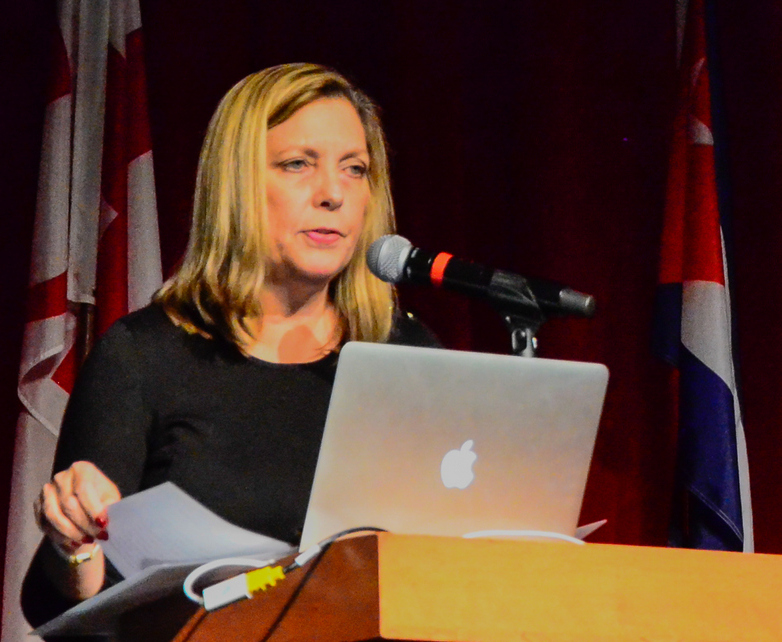 In 2015,
early on in the negotiations, she recalled that an interviewer asked
her if the ongoing process of rapprochement could still be reversed.
"My response then was that, 'of course, that was possible'" she said.
"Recent events proved it right... unfortunately so," she added. She
said that "the deep differences that exist between us will last and the
normalization of ties with the United States will always be a complex
and prolonged process, that we may never fully reach." Nonetheless, she
still believes "it is possible to develop a civilized coexistence
between both countries," she said. In 2015,
early on in the negotiations, she recalled that an interviewer asked
her if the ongoing process of rapprochement could still be reversed.
"My response then was that, 'of course, that was possible'" she said.
"Recent events proved it right... unfortunately so," she added. She
said that "the deep differences that exist between us will last and the
normalization of ties with the United States will always be a complex
and prolonged process, that we may never fully reach." Nonetheless, she
still believes "it is possible to develop a civilized coexistence
between both countries," she said.
The relations improved when they did, she said,
because the Obama government finally "recognized the legitimacy of the
Cuban government and its historical leadership," did not impose
conditions on Cuba nor demand concessions to its domestic and foreign
policy, and treated Cuba as an equal. While the U.S. did not abandon
its goal of ultimately imposing its will on Cuba, "negotiations and
dialogues took place based on respect and reciprocity. Both parties
undertook the negotiations in a constructive spirit, willing to find
solutions to outstanding problems and identify areas of common interest
in which the two countries could cooperate for mutual benefit."
The elephant in the negotiation room, of course,
was the ongoing, nearly 60-year-old U.S. blockade, which could only be
ended by Congress. "I have to remind you," Vidal told the audience,
"that the total lifting of U.S. unilateral measures of economic
coercion preceded similar processes with other countries."
Cuba, she said, had a "realistic recognition" of
Congress' role in ending the blockade, but also understood "the wide
use that the President could make of his prerogatives to implement [the
embargo] in a flexible way. That is why we insisted permanently on this
point."
What the two countries achieved in just two
years, she says, was "not irrelevant," and it demonstrated that a "new
type of relationship based on respect and equality was possible."
There was still much work to do to improve those
relations, she added, when along came Donald Trump. Just as the Obama
administration had used its executive powers to improve relations, the
Trump administration "has dismantled almost everything that was done
with the Obama administration... Trump has even gone further,
implementing measures that are unprecedented for their level of
aggressiveness and scope," including activating Title III of the Helms-Burton Act
and even attempting to cut off fuel supplies to Cuba.
Today, she points out, the U.S. embassy in Havana
is "practically inoperative" and "there are no official contacts beyond
the formal ones that exist at a low level, not even to deal with
matters of the highest priority."
Despite all of that, Vidal says she sees the
future "with serenity and still with some optimism, I would dare to
say... As the Cuban Foreign Minister recently stated, we hope this will
be a temporary situation, a low moment."
While the two sides will eventually need to work
to "restore and recover many things dismantled by the current U.S.
government," Vidal says even that will not be enough. "The current
setback reconfirms that the will and the executive powers of a U.S.
President are not enough; that in order to ensure the long-term
irreversibility of an improvement of relations, deeper changes are
necessary in the American political context, including in the embargo
legislations."

The Havana Syndrome: An Answer from Science
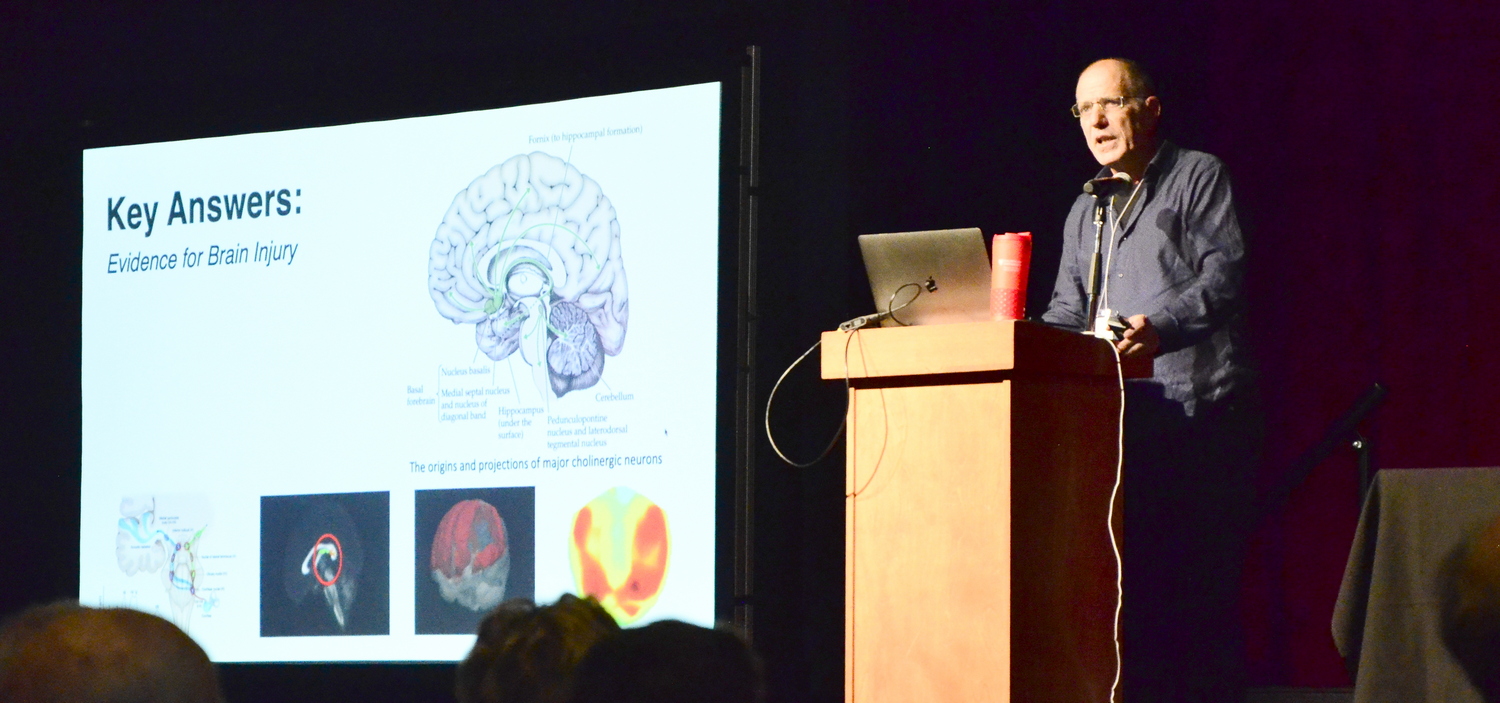
Dr. Alon Friedman addresses the conference on November 1, 2019.
Dizziness, blurred vision, memory loss, problems
focusing... Something serious seemed to be affecting U.S. diplomats in
Havana in late 2016 and 2017. But what? And who -- or what -- was
responsible?
The new Trump administration, without evidence,
blamed the Cuban government and hinted darkly U.S. diplomatic personnel
had been targets of "sonic attacks" using a previously unknown secret
weapon.
That was the first of many theories put forward
to explain what was happening -- from mass hysteria to the call of the
Indies short-tailed cricket. Most were debunked; nothing was proved.
But U.S. diplomats weren't the only ones
reporting symptoms. Some Canadian diplomats complained as well and, in
the spring of 2018, Global Affairs Canada commissioned Dalhousie
University's Brain Repair Centre in Halifax to investigate and report
back.
On November 1, Dr. Alon Friedman, the Brain
Repair Centre's lead researcher on the project, discussed the findings
in a keynote talk at "The Cuban Revolution at 60" conference.
The Dalhousie researchers -- 15 principal
investigators and their teams -- began by trying to replicate the
results of a preliminary study by researchers at the University of
Pennsylvania. The UPenn researchers reported that what had happened to
the U.S. personnel represented a "new syndrome that resembles
persistent concussions," but they were unable to identify its cause.
The Halifax researchers wanted to take the next
step and figure out what had actually caused the symptoms.
They began by testing the Canadian diplomats
who'd reported the symptoms using a multi-disciplinary approach for
studying brain injury, including new methods of brain scanning. Perhaps
most importantly, they also performed before-and-after scans on the
brains of eight other diplomats who had been posted to Havana during
the time of their study.
All those who had spent time in Havana showed
similar damage to distinct brain regions, which are associated with
memory consolidation, concentration and the sleep-wake cycle.
Friedman -- an Israeli-trained medical doctor
with a PhD in neuroscience -- recognized what he was seeing on the
scans from his own research 30 years before. "There are very specific
types of toxins that affect these regions of the brain," he explained.
Those include insecticides, specifically organophosphate pesticides as
well as other organophosphates -- neurotoxins that actually work by
inhibiting the actions of cholinesterase, a key enzyme required for the
proper functioning of the nervous system.
But that raised a critical next question. How had
the diplomats come into contact with those neurotoxins?
While there were potentially nefarious
explanations -- a sarin gas attack on a Tokyo subway in 1995, the
poisoning of Korean leader Kim Jong Un's half-brother in 2017 -- both
involved single high-dose exposures that didn't explain what had
happened in Havana.
"It was like a detective story," Freidman
recounts. The researchers explored various potential avenues of
explanations, tested them and found them wanting.
"With the help of Dr. Google," Friedman joked,
they eventually connected the dots back to a very public mass
fumigation campaign the Cuban government itself launched in 2016 to
combat a major outbreak of mosquito-borne Zika virus in the Americas,
including in the Caribbean.
Toxicological analysis of the Canadian victims
confirmed the presence of a pyrethroid and an organophosphate, two
compounds used in the fumigation products the Cubans had sprayed.
Using the Canadian embassy's own records, the
researchers also discovered spraying had been carried out inside and
outside their residences. The facilities were sprayed far more often
than expected -- sometimes every two weeks. And the researchers also
found a correlation between the number of fumigations performed at a
diplomat's residence and the seriousness of the symptoms they reported.
This brought the researchers to their working
hypothesis. "We report the clinical, imaging and biochemical evidence
consistent with the hypothesis of over-exposure to cholinesterase
inhibitors as the cause of brain injury," the study concluded.
That isn't the end of it, of course. More
research needs to be done, including figuring out how to better
understand the danger levels of the various toxins and, of course,
there is still the public health concern. Who else might have been
affected, including Cuban citizens working at the embassies, living
around the same neighbourhoods or involved in the spraying?
The good news is that Dr. Friedman has met with
Cuban health professionals and they are currently working together to
determine those next research steps.

Panel Discussions

Panel discussion on Cuba and the Cuban Revolution, October 31, 2019,
with (left to right) Rafael Hernandez, Chief Editor, Temas; Ambassador
Josefina Vidal; William LeoGrande, American University School of Public
Affairs; and Emily Morris, University College London.
The opening panel of "The Cuban Revolution at 60"
conference held the evening of October 31 addressed "Cuba and the Cuban
Revolution: Overview and Personal Reflections." Panelist Rafael
Fernandez, the chief editor of the Cuban social science periodical Temas,
noted that the Cuban Revolution set its foundation in its
first five years when Fidel Castro mobilized the people, particularly
the youth, to defend the revolution in a civil war against the
counter-revolutionary forces funded and supported by the U.S. The
people's victory in this civil war, Hernandez said, has been etched in
the historical memory of the Cuban people and has helped them find
their bearings over six challenging decades in which Cuba has gone from
strength to strength. He expressed confidence that, with all the
economic, political and social challenges Cuba faces today, the people
will continue to defend their revolution and decide on their future
themselves.
Cuba's Ambassador to Canada, H.E. Josefina Vidal
was another member of this panel. She reflected on Cuba-U.S. relations
and their effect on the peoples of both countries. She emphasized that
despite the setbacks in relations under the Trump administration,
public opinion in Cuba, the U.S. and around the world favours
normalized U.S.-Cuba relations. She noted that the international
solidarity and support of the Canadian people and peoples of the world
has had a profound impact on the Cuban people and noted that
the November 7 vote at the UN General Assembly against the
U.S. blockade would undoubtedly once again show the broad support of
the world's peoples for Cuba.
The first panel on the second day was entitled
"Setting the Historical Scene: Evolution of the Revolution." Amongst
other things, panelists discussed the challenges posed to living under
the brutal U.S. sanctions and blockade. Also discussed was the
revolutionary leadership of Fidel Castro, Raúl Castro and
now President Miguel Díaz-Canel to mobilize the Cuban people
to defend their sovereignty and independence under all conditions and
circumstances by sticking to their principles. Carlos Alzugaray, former
diplomat and member of the Temas editorial board,
was asked during the question period to sum up the difference between
Cuba in 1959 and Cuba today. He affirmed that since 1959 Cuba has more
relations and deeper engagement with the nations and peoples of the
world; that social justice has been broadened and deepened along with
the democratic participation of the people, and that, in terms of the
economy, Cuba still maintains its independence and is mobilizing to
renovate the economy to serve the people's needs today.
The next panel, entitled "Surviving Climate
Change, Envisioning the Ecological Future," discussed how Cuba is
addressing climate change and some of the measures the Cuban state is
taking in this regard. Highlighted by the panel was Tarea Vida, or Life
Project, a 100-year plan adopted by the Cuban Council of Ministers to
deal with hurricanes and other natural disasters which are on the rise
in the region because of climate change. Measures under the Tarea Vida
program include educating and mobilizing citizens of all ages to deal
with storms and hurricanes with the view of meeting these disasters in
an organized way, thus providing security for the people and protecting
human life. Professor Emily Kirk of Dalhousie University noted that the
measures taken by the Cuban government have reduced the loss of life
and damage to property to a minimum, thanks to the foresight of the
Cuban state, in contrast to the experience in other Caribbean nations
and the U.S. itself. The four women panelists, three of whom work for
U.S. non-governmental agencies, highlighted Cuba's stellar efforts in
crisis-management, economic reform and building a sustainable
ecological future for its citizens despite many challenges. One of the
speakers noted that Cuba is a world leader in tackling climate change
and that when considered in the context of the brutal U.S. blockade and
sanctions, this is remarkable.
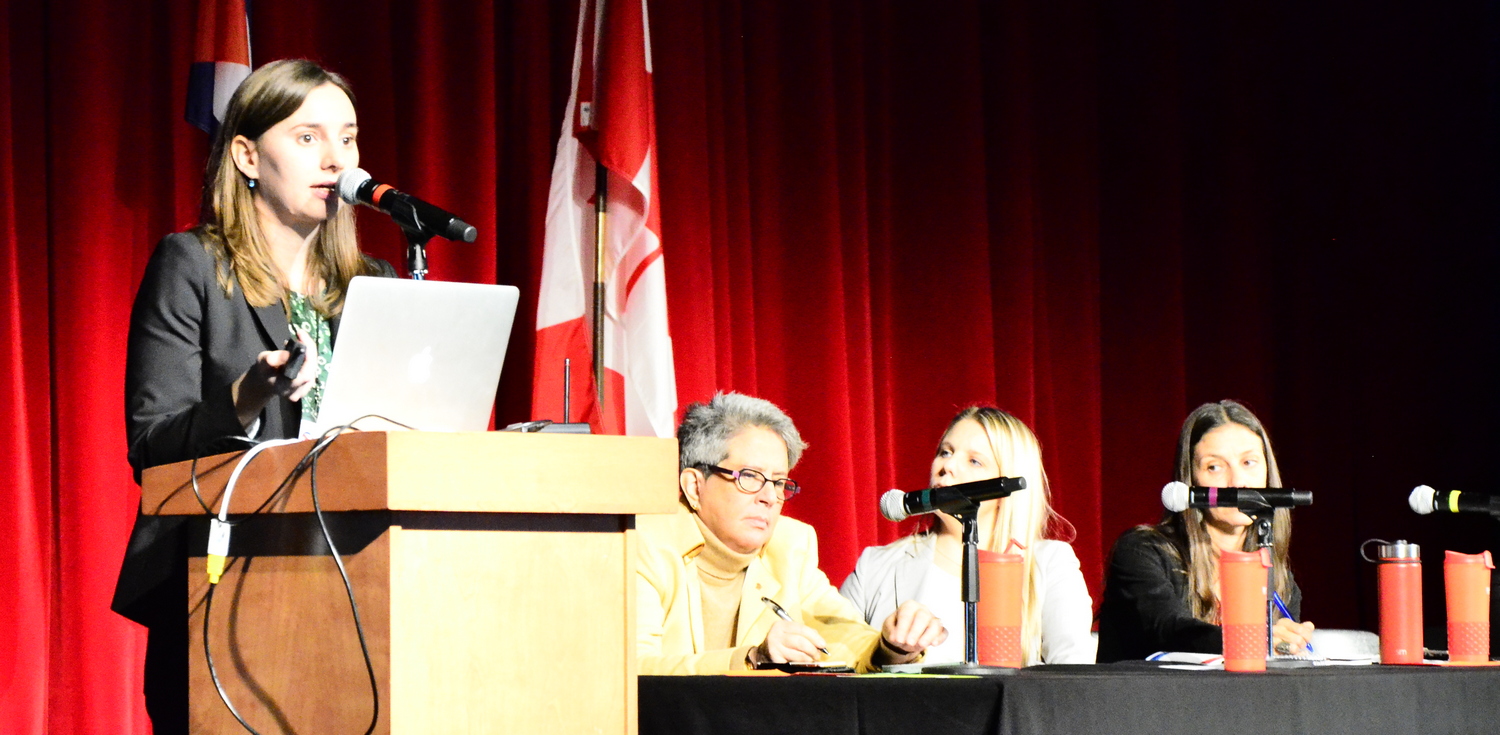
Panel on Cuban and climate change, November 1, 2019, with Rebekah
Stewart, Center for Responsible Travel; Julia Sagbien, Dalhousie
University, Valerie Miller, Environmental Defense Fund; and
Margarita Fernández Vermont Caribbean Institute.
A third panel entitled "Social Change in Cuba:
Past Successes, Future Challenges," looked at the measures and
challenges over the last 60 years in ensuring the rights of the people
in the context of Cuba's social and political development. The panel
brought out the Cuban state's outstanding efforts to ensure the basic
rights of the Cuban people in spite of, and in defiance of, the U.S.
embargo, sanctions and hostility towards Cuba. Panelists noted that
since 1959, the Cuban state has enacted laws to ensure that health
care, housing, education, and other basic rights are guaranteed, while
at the same time taking measures to end the racism and discrimination
inherited from the previous society. While acknowledging that there are
still many challenges, it was noted that the new Cuban constitution
provides protection for the LGBTQ community and is working to harmonize
the various claims of the people of minority collectives within Cuban
society with those of the rest of society.
The third day began with a panel discussion on
Cuba's economy, entitled "Economic Change in Cuba: Successes and
Challenges." This necessarily included the current situation where the
Trump administration is stepping up the illegal U.S. blockade. Most
recently this is the reactivation of Title III of the unjust and brutal
Helms-Burton Act of 1996. This
legislation permits those parties whose property was nationalized by
the Cuban government in 1959 (through the proper legal mechanisms) to
sue for compensation in U.S. courts, those companies deemed to be
"trafficking" the properties in question, including Canadian companies
and individuals doing business in Cuba.
It was noted that with the collapse of the former
Soviet Union and the Eastern Bloc countries, additional pressure was
exerted on the Cuban economy which triggered the "Special Period" when
the government took special measures to provide for the people while
safeguarding Cuba's independence and sovereignty. It was noted that the
U.S.-led campaign today to destabilize the Maduro government in
Venezuela has created additional burdens which the Cuban people and
state are facing courageously. They are also taking ongoing measures
such as expanding the private sector, mobilizing the military in
production, and establishing cooperatives in agriculture to encourage
foreign investment and food self-sufficiency.
One of the speakers pointed out that "You don't
get Cubans to give concessions on the basis of pressure." The long
historic struggle of the Cuban people for their independence and
self-determination against the U.S. hegemonism has sharpened their
resilience and resolve to uphold their principles and maintain their
dignity as a people.
The panel also noted that the attitude of
successive U.S. governments towards Cuba is counter-productive and out
of step with the times. It is also out of step with the desire of the
people of the U.S. who would like to have peaceful and normal relations
with the people of Cuba, who share the same sentiment.
In the panel discussion entitled "Cuba's
International Relations, Now and Tomorrow," what was most striking was
Cuba's profound internationalist spirit and desire for friendly
relations with all nations and peoples, including the U.S. Despite
having their own difficulties and challenges, the Cuban people over 60
years have always been ready to do their internationalist duty, and
have been unstinting in providing assistance to those who ask for help.
These unparalleled efforts include the 15-year contribution to the
Angolan people to defeat the South African invaders and break the back
of apartheid, and the 30,000 medical personnel now contributing their
knowledge and expertise in countries around the world, including in
Venezuela. It was noted that these selfless acts have contributed to
isolating the U.S., while at the same time raising Cuba's prestige
internationally.
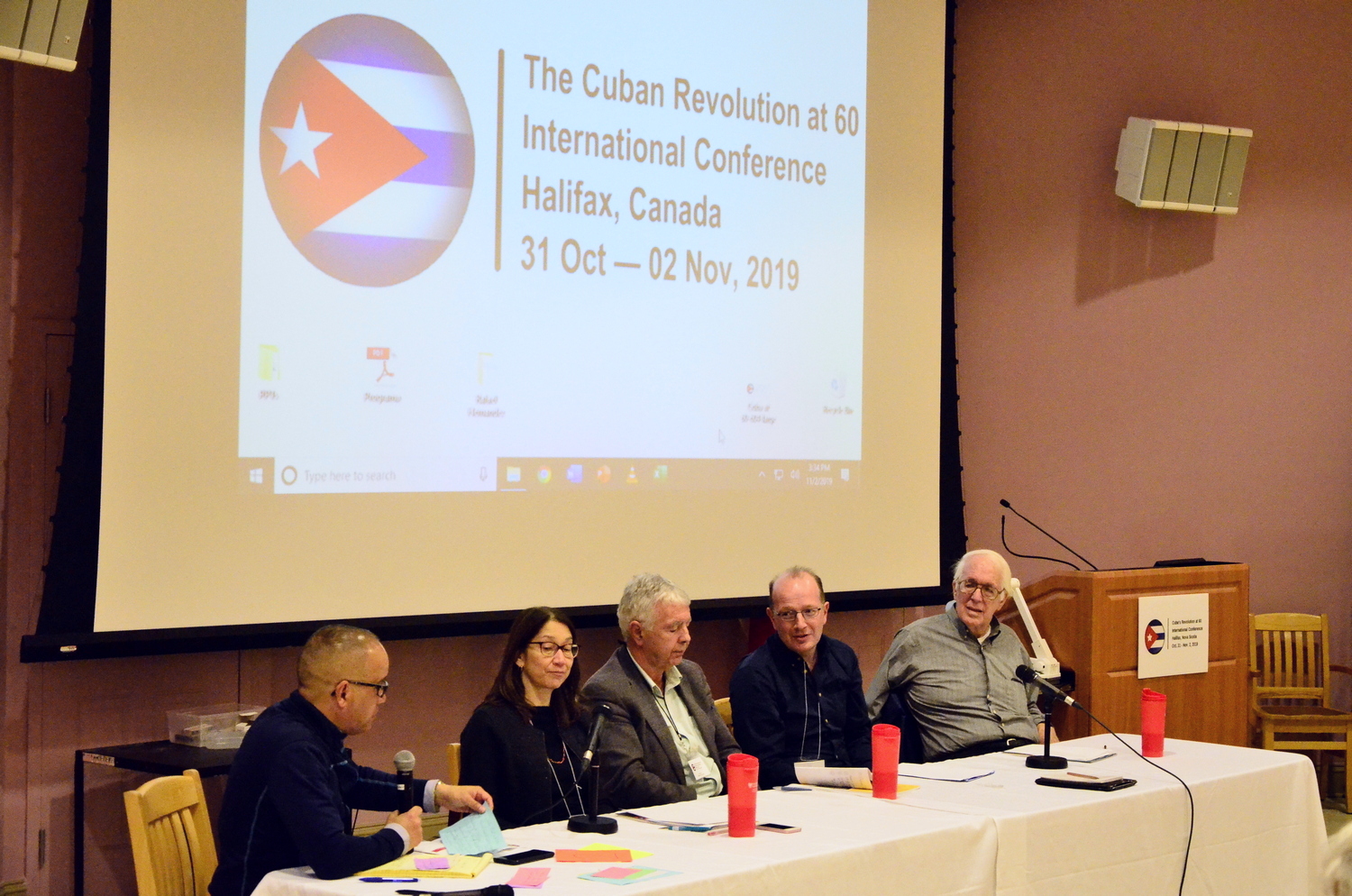
Panel on Cuba's international relations, November 2, 2019, with (left
to right) Prof. Isaac Saney; Ana Covarrubias, Colegio de
México; Prof. John Kirk; Mervyn Bain, University of
Aberdeen;
and H. Michael Erisman, Indiana State University.
This historic conference in Halifax ended with a
closing plenary "Survival, Development and Sovereignty," featuring a
panel that included Ambassador Vidal. She noted that Cuba has many
challenges, particularly on the economic front and among the measures
it is taking to address this problem, it is placing high priority on
the Cuban embassies and missions abroad to seek out new economic
opportunities and partnerships. She emphasized that Cuba will not only
survive, it will resist and thrive in the future. She thanked the
Canadian people for their support for Cuba and noted that there has
been some success in working with the Canadian government to improve
relations. As an example, she noted that thanks to the many letters and
phone calls from Canadians and Cubans resident in Canada, the Canadian
Visa office in Havana has been partially reopened after it was closed
unilaterally in May this year.
Another panelist, Hal Klepak, Professor Emeritus
at the Royal Military College in Kingston, emphasized the remarkable
achievements of the Cuban revolution and expressed his conviction that
the Cuban people, despite having many problems over the last 60 years,
will continue to be an inspiration to the peoples of the world.

(To access articles
individually click on the black headline.)
PDF
PREVIOUS ISSUES | HOME
Website:
www.cpcml.ca Email: editor@cpcml.ca
|